Big stories of the year 2010
A look at the major events of the year 2010.
-
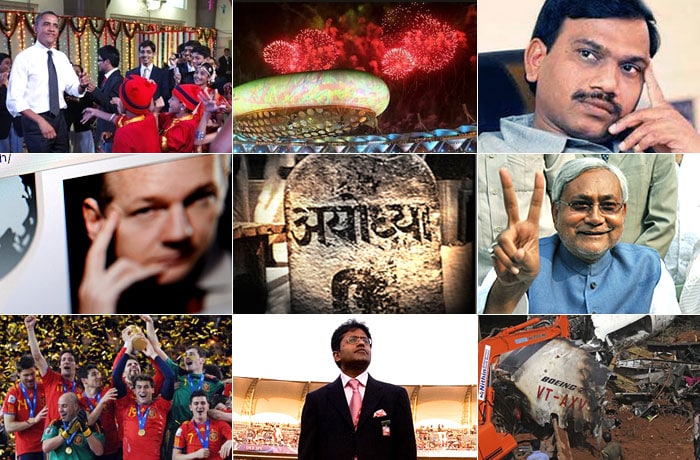 The BJP's LK Advani calls it the year of stinking scams. That's a political view, but scams were among some of the big stories of 2010.
The BJP's LK Advani calls it the year of stinking scams. That's a political view, but scams were among some of the big stories of 2010.
At the end of the year, here are the major happenings.
It was a year of scams – CWG, IPL, 2G spectrum, Adarsh, Karnataka land grab.
A year of coming together and falling apart – Mukesh & Anil Ambani, Hero-Honda split, Sania and Shoaib, Sunanda and Shashi Tharoor.
It was a year of revelations - the Ayodhya verdict and the Bhopal gas tragedy verdict.
It was a year of celebrations - Sachin became the first batsman to score 200 runs and a record medal haul of 101 medals for India in the Commonwealth Games 2010.
It was a year of catastrophes - the Haiti quake and the Cambodia stampede.
Ranging from sports to entertainment; from politics to business, there was so much that happened that eventually the year came to an end but the controversies ceased to end.
Here's a look. -
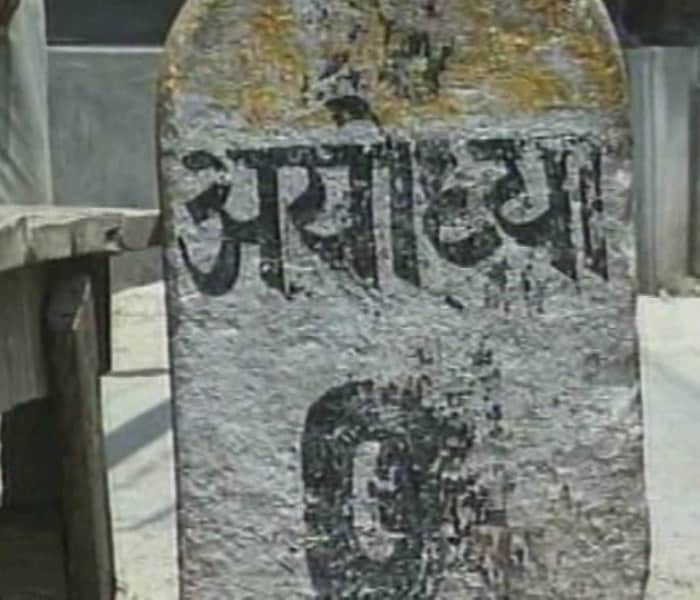 Sixty years after it first went to court, the verdict on the Ayodhya title suit was pronounced by the Allahabad High court on September 30 this year.
Sixty years after it first went to court, the verdict on the Ayodhya title suit was pronounced by the Allahabad High court on September 30 this year.
The three-judge bench - comprising Justice S U Khan, Justice Sudhir Agarwal and Justice D V Sharma - ruled in a majority judgment 2:1, that there be a three-way division of the disputed land - one-third for the Sunni Waqf Board, one-third for the Nirmohi Akhara and one-third to the party for 'Ram Lalla'. -
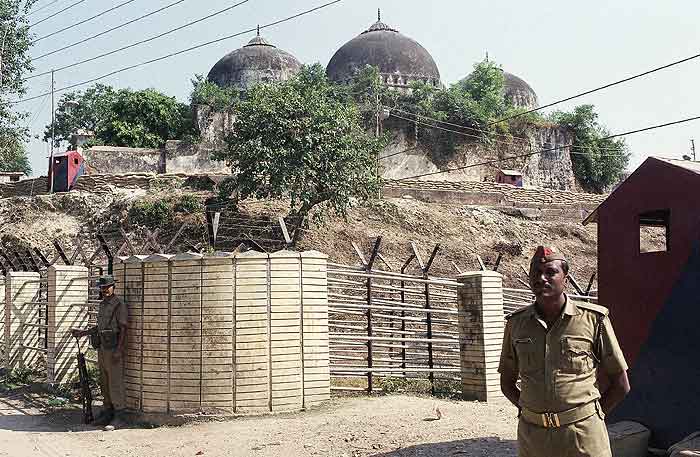 The dispute dates back to December 1949, when an idol of Lord Ram is said to have been placed in the central dome of the Babri Masjid to lay claim to the land as Lord Ram's birth place. The first title suit was filed in January 1950.
The dispute dates back to December 1949, when an idol of Lord Ram is said to have been placed in the central dome of the Babri Masjid to lay claim to the land as Lord Ram's birth place. The first title suit was filed in January 1950.
This dispute led to the demolition of the Babri Masjid in 1992 by Karsevaks led by LK Advani and other leaders of the RSS, VHP and the BJP.
The demolition fuelled communal tensions and sparked violent Hindu-Muslim riots across the country, which killed thousands of people from both communities. -
 The 2010 Haiti earthquake, an incident termed as "catastrophe of major proportions", left over 2 lakh people dead and millions homeless. The 7.3-magnitude quake rocked the Caribbean nation in January this year. It was the largest earthquake to hit the country since 1984.
The 2010 Haiti earthquake, an incident termed as "catastrophe of major proportions", left over 2 lakh people dead and millions homeless. The 7.3-magnitude quake rocked the Caribbean nation in January this year. It was the largest earthquake to hit the country since 1984.
International help came in thick and fast but lack of proper infrastructure in the poor country impeded rescue work.
In October 2010, there was an outbreak of Cholera in Haiti that affected over 2000 people. There were fears the outbreak would reach camps housing survivors of January's quake.
In early November, Hurricane Tomas hit the nation, causing widespread flooding. -
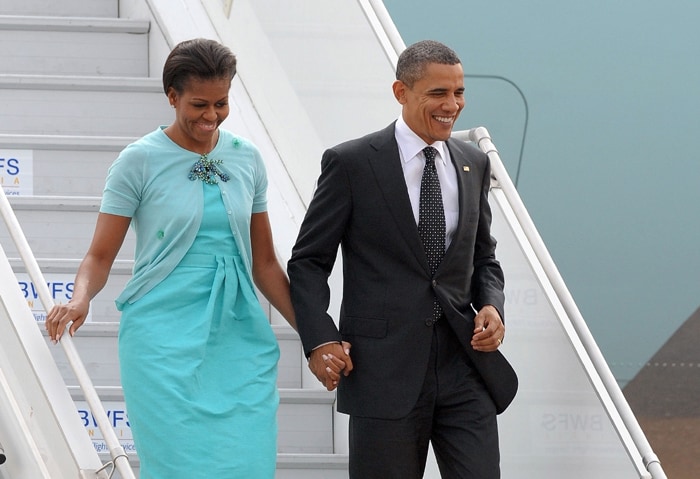 US President Barack Obama made his maiden state visit to India from November 6 to November 9 this year. The four day trip was his longest state visit and the 200 business leaders accompanying him formed the biggest corporate delegation in the history of United States' state visits.
US President Barack Obama made his maiden state visit to India from November 6 to November 9 this year. The four day trip was his longest state visit and the 200 business leaders accompanying him formed the biggest corporate delegation in the history of United States' state visits.
With United States facing the worst economic crisis since the Great Depression , Obama's primary agenda was to forge business deals with Indian companies that would create jobs for Americans. He signed deals worth $10 billion with India that would create about 54,000 jobs in the US. -
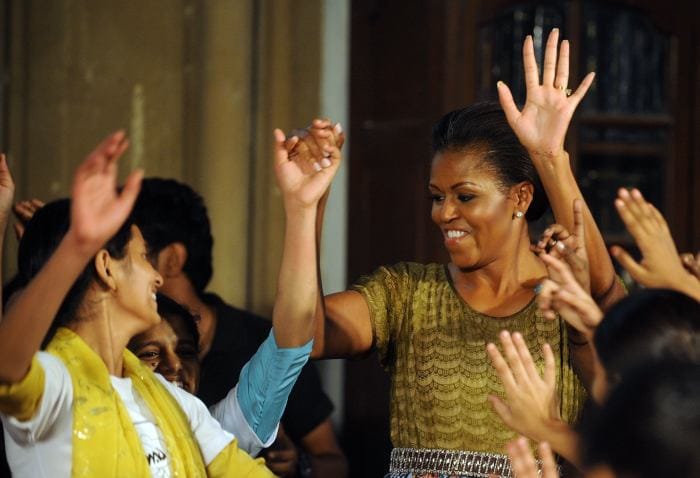 During the visit, the President and the first lady Michelle Obama interacted with school kids and also addressed a group of youngsters at St.Xaviers' college in Mumbai. During his interaction with the college students, Obama rolled up his sleeves and answered tough questions, ranging from jihad and spirituality to United States' partnership with Pakistan, with sincerity and spontaneity.
During the visit, the President and the first lady Michelle Obama interacted with school kids and also addressed a group of youngsters at St.Xaviers' college in Mumbai. During his interaction with the college students, Obama rolled up his sleeves and answered tough questions, ranging from jihad and spirituality to United States' partnership with Pakistan, with sincerity and spontaneity.
Obama's charisma and Michelle's charm left an indelible impression on the students. Images of Michelle joyfully dancing to Indian tunes including Rang De Basanti will continue to remain clearly etched in the memory of the students. -
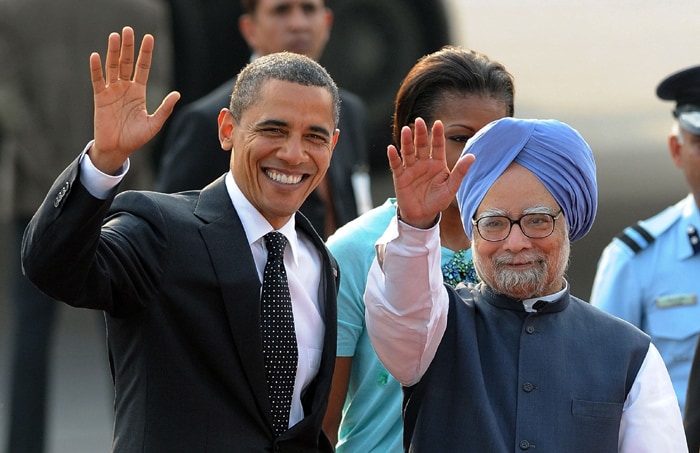 Right from the moment he entered the Central Hall of Parliament, Obama enthralled its members. His address to the joint session of the Parliament, started with his customary 'Namaste'.
Right from the moment he entered the Central Hall of Parliament, Obama enthralled its members. His address to the joint session of the Parliament, started with his customary 'Namaste'.
His mesmerizing speech struck all the right notes. The President of the world's oldest democracy had prepared well to connect with the representatives of world's largest democracy, seasoning his speech with words like 'Jai Hind' & 'Panchatantra' and showing his faith in the Gandhian ideology. Obama also pledged his support for a permanent UNSC seat for India. -
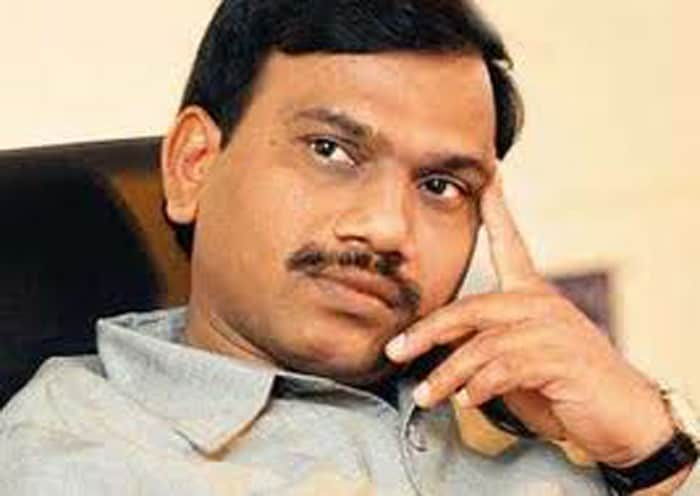 The 2G spectrum scam, believed to be India's largest-ever swindle, cost the nation a whopping 1.76 lakh crores.
The 2G spectrum scam, believed to be India's largest-ever swindle, cost the nation a whopping 1.76 lakh crores.
Ever since allegations of misappropriation of funds during bidding of 2G spectrum surfaced, the ruling politicos in Delhi and Tamil Nadu had a tough time.
After dodging the question of resigning for months, and putting the UPA in a jeopardy, Minister of Telecommunications and IT, A Raja finally put in his papers.
In 2008, 2G licenses were issued to private players at throwaway prices. This cost the government 1.76 lakh crore rupees in revenues. The Controller and Auditor General(CAG) has in its report alleged that rules and procedures were flouted in the bidding process. -
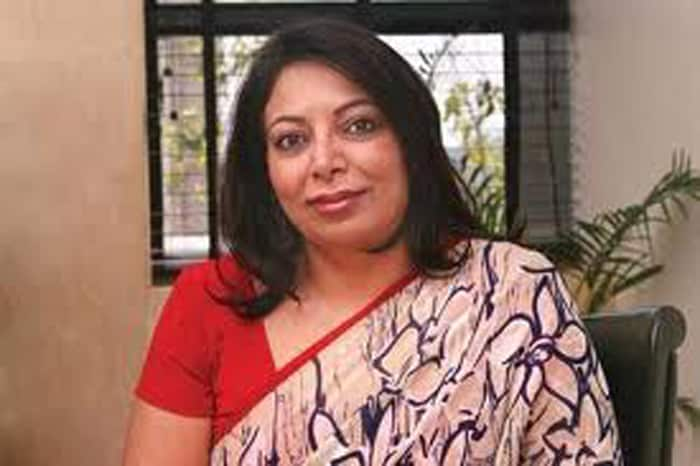 The spectrum scam led to a series of events that shook the nation. The Supreme Court for the first time in its history questioned a Prime Minister on his inaction. Dr. Manmohan Singh had been accused of not acting on the issue for over a year.
The spectrum scam led to a series of events that shook the nation. The Supreme Court for the first time in its history questioned a Prime Minister on his inaction. Dr. Manmohan Singh had been accused of not acting on the issue for over a year.
Then came the Radia tapes that rocked all the pillars of democracy. Corporate lobbyist Niira Radia was accused of fixing mobile bandwidth licenses on behalf of corporates. The Income Tax department recorded her conversations with A Raja, corporate bosses and top journalists.
It also brought the appointment of the Chief Vigilance Commissioner(CVC) PJ Thomas into question. Thomas was the telecom secretary when the licenses were issued.
The JPC - Joint Parliamentary Committee - on the 2G scam became the stand-off between the government which won't sanction it, and the Opposition, which insists it's a must-have. The winter session of Parliament saw a total freeze - in 23 days, the Rajya Sabha assembled for just three hours and the Lok Sabha assembled for just seven hours, resulting in a total loss of Rs 146 crores. -
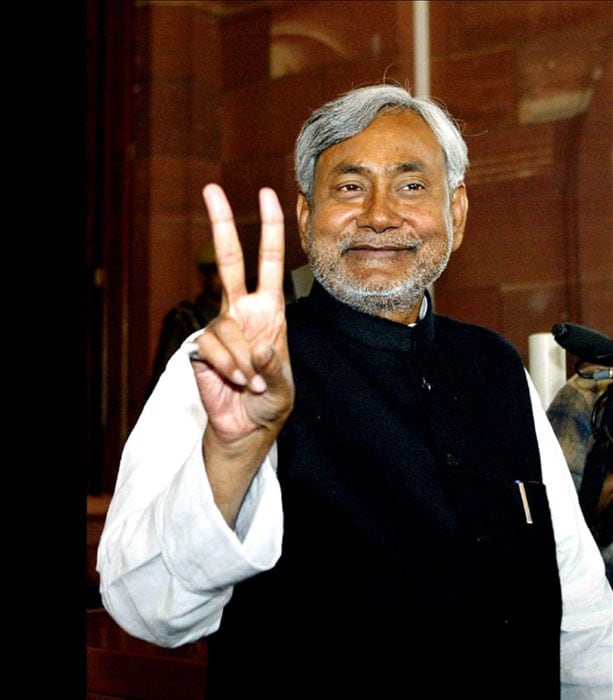 Elections 2010 marked the dawn of a new era in the Hindi heartland of Bihar. The JD(U)-BJP alliance led by the incumbent chief minister Nitish Kumar beat the anti-incumbency factor. The alliance won a four-fifths majority in what was once India's poorest states that had been mired in caste politics and jungle raj for decades till the Lalu-Rabri reign ended in 2005.
Elections 2010 marked the dawn of a new era in the Hindi heartland of Bihar. The JD(U)-BJP alliance led by the incumbent chief minister Nitish Kumar beat the anti-incumbency factor. The alliance won a four-fifths majority in what was once India's poorest states that had been mired in caste politics and jungle raj for decades till the Lalu-Rabri reign ended in 2005.
Nitish Kumar called it the victory of development. “This is Bihar's nayi kahani.Voters had to choose between progress and antiquated politics. They have chosen to surge ahead.” -
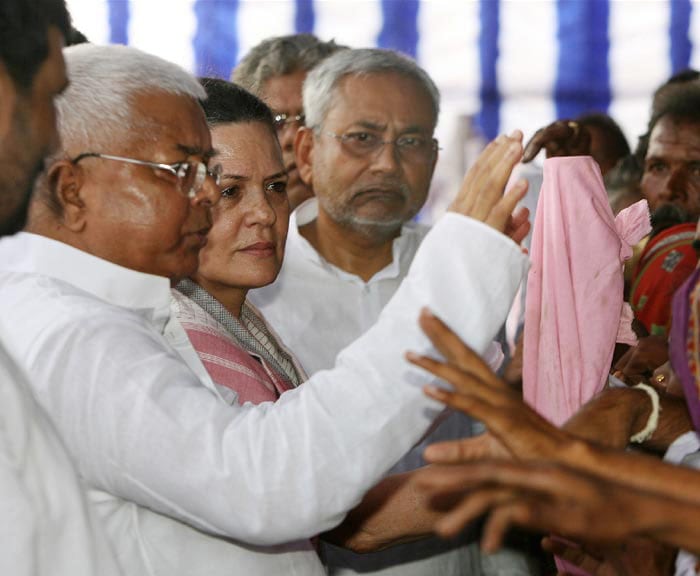 While the NDA won 206 of the total 243 seats, JD(U) alone bagged 115 seats, just a dozen short of the majority mark. BJP also put up a stunning performance winning 91 of the 102 seats it contested.
While the NDA won 206 of the total 243 seats, JD(U) alone bagged 115 seats, just a dozen short of the majority mark. BJP also put up a stunning performance winning 91 of the 102 seats it contested.
All the other parties suffered severe humiliation. Lalu's RJD managed just 22 seats and Congress won an abysmally low four of the 243 seats it contested for. -
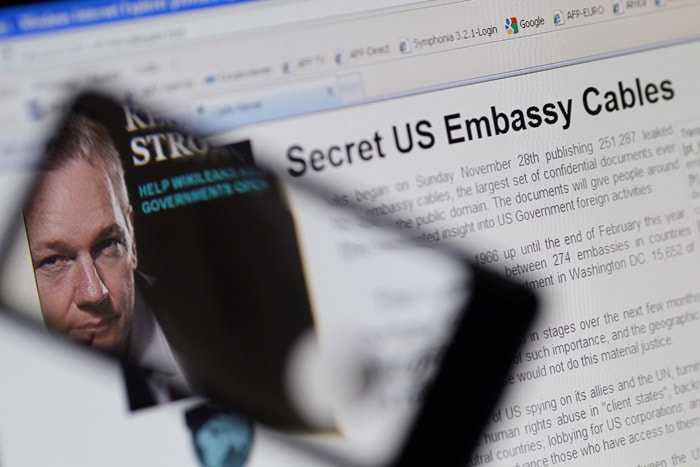 Whistle blowing website WikiLeaks made news this year when it made public millions of American diplomatic cables. It came into limelight when it released the Afghan War diaries in July this year that gave an account of United States' policy in the Afghanistan war.
Whistle blowing website WikiLeaks made news this year when it made public millions of American diplomatic cables. It came into limelight when it released the Afghan War diaries in July this year that gave an account of United States' policy in the Afghanistan war.
The latest WikiLeaks release in November end gave an unprecedented and candid account of backroom bargaining among diplomats, frank views about international leaders and of terrorist threats.
The disclosures rattled the world of international diplomacy, threatening to jeopardize United States' relations with its allies.
WikiLeaks founder Julian Assange, was arrested in Britain on December 7, 2010 after the Interpol issued an arrest warrant against him over accusations of sex crimes. Millions of supporters pledged their support for WikiLeaks and signed petitions demanding Assange to be released. After a week in detention facing possible extradition, he was released on $310,000 bail by a court on December 15th. -
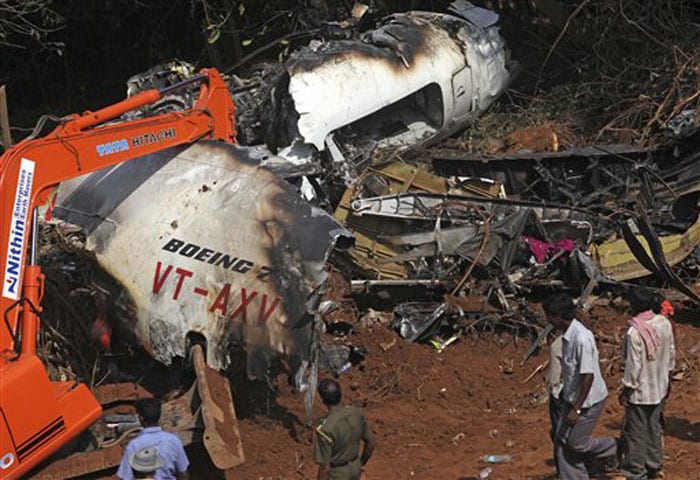 In May this year, India witnessed its worst air disaster in over a decade. An Air India Express aircraft from Dubai to Mangalore overshot the runway while landing at the airport, went down a ravine and burst into flames. 158 of the 166 people on board were killed while the remaining 8 miraculously survived.
In May this year, India witnessed its worst air disaster in over a decade. An Air India Express aircraft from Dubai to Mangalore overshot the runway while landing at the airport, went down a ravine and burst into flames. 158 of the 166 people on board were killed while the remaining 8 miraculously survived. -
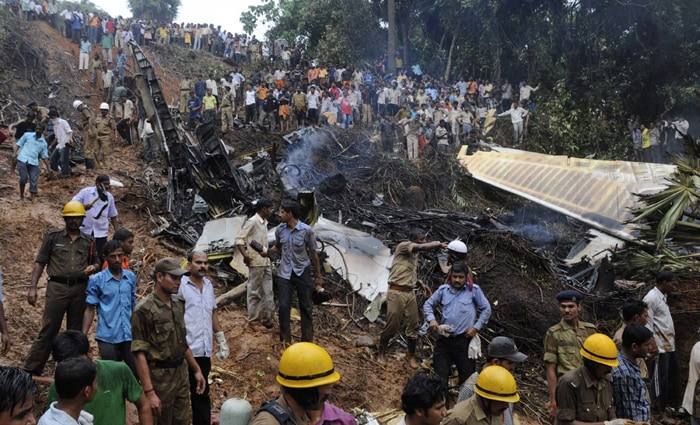 The Boeing 737-800 was piloted by an experienced Serbian pilot Zlatko Glusica. A probe panel in its report said that disorientation and delayed response by the pilot, who had reportedly dozed off and ignored his co-pilot's warnings during landing, may have led to the aircrash.
The Boeing 737-800 was piloted by an experienced Serbian pilot Zlatko Glusica. A probe panel in its report said that disorientation and delayed response by the pilot, who had reportedly dozed off and ignored his co-pilot's warnings during landing, may have led to the aircrash. -
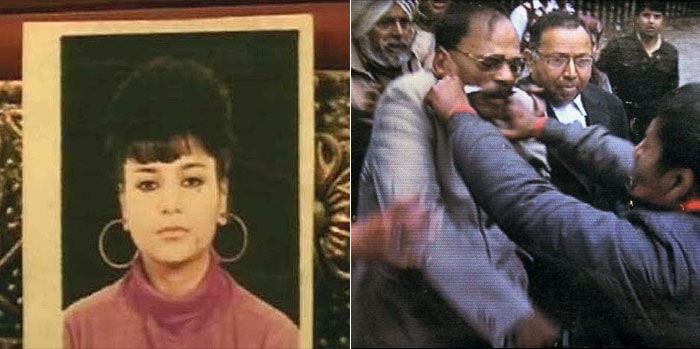 While it took 19 years and more than 400 hearings for the court to award Ruchika Girhotra's molester DGP SPS Rathore 18-month jail term, it took just 6 months for the Supreme Court to grant him bail.
While it took 19 years and more than 400 hearings for the court to award Ruchika Girhotra's molester DGP SPS Rathore 18-month jail term, it took just 6 months for the Supreme Court to grant him bail.
Images of a smiling SPS Rathore coming out of jail were all over the television channels that caused public outrage. In February this year, he was stabbed in the face with a pocket knife by a student from the prestigious NID.
In 1990, Ruchika Girhotra who was a budding tennis player was molested by Rathore which was witnessed by her best friend Aradhana.Ruchika filed a case against him, a bold step for which her family had to bear repercussions.
Ruchika was expelled from school for indiscipline. Three years later, her brother was arrested for multiple cases of theft, which her family alleged was police revenge. Ruchika killed herself by drinking poison in 1993, immediately after which cases against her brother were dropped. -
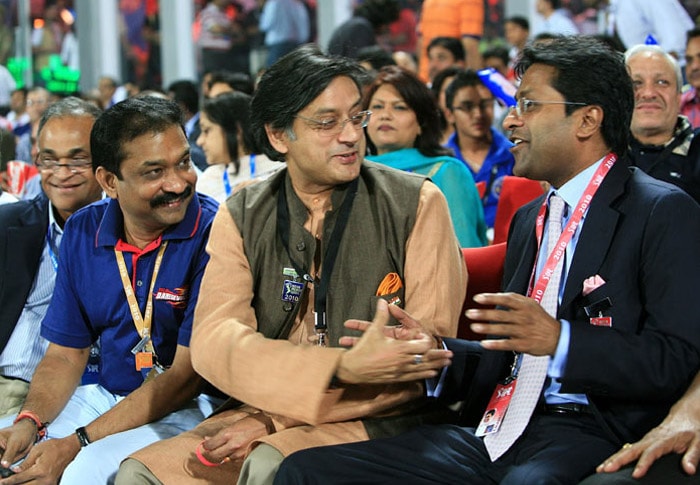 The third season of the Indian Premier league was shrouded in controversies. It all began when Lalit Modi, the then Commissioner of the IPL, oversaw the bidding process and creation of two new teams - Kochi and Pune.
The third season of the Indian Premier league was shrouded in controversies. It all began when Lalit Modi, the then Commissioner of the IPL, oversaw the bidding process and creation of two new teams - Kochi and Pune.
The virtually unknown Rendezvous Sports World Group pipped the likes of Adani Group and Videocon to clinch the ownership of the Kochi IPL franchise.
Soon the whole affair snowballed into a devastating controversy when Modi revealed the team's ownership pattern on the social networking site, Twitter.
All hell broke loose when it emerged that the then union minister Shashi Tharoor's close friend Sunanda Pushkar had been given a sweat equity worth Rs 70 crore in the team.
Tharoor resigned as a result and the nationwide IT raids on IPL and its franchisees' offices revealed murky details of financial dealings and kickbacks that allegedly Modi got. -
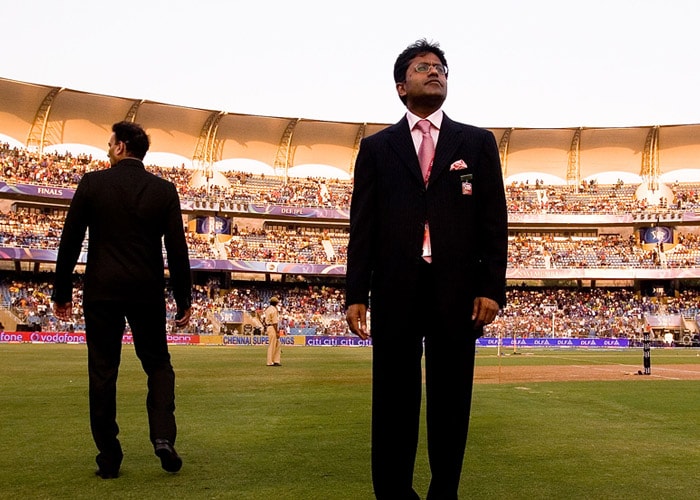 Investigations by authorities revealed massive irregularities in financial, broadcast, internet deals and rigging of bids in favour of Rajasthan Royals and Kings XI Punjab.
Investigations by authorities revealed massive irregularities in financial, broadcast, internet deals and rigging of bids in favour of Rajasthan Royals and Kings XI Punjab.
Lalit Modi was found guilty on these charges and was suspended from his post of the IPL commissioner.
Rajasthan Royals and Kings XI Punjab were later expelled from the fourth season of the IPL while the Kochi franchise, after months of confusion over its ownership pattern was finally given a green signal by the BCCI. -
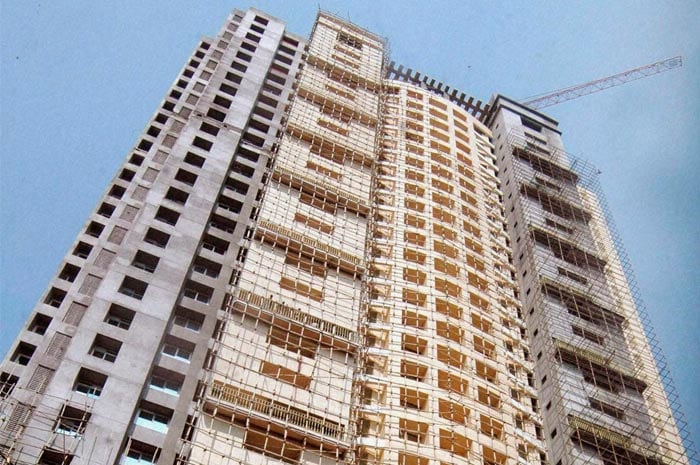 The controversy surrounding the Adarsh Housing society in Mumbai's up market Colaba area jolted the esteemed defence establishment and the political circles alike. Originally meant for former and serving defence personnel, particularly the Kargil war heroes, flats in the society were allotted to top defence personnel, bureaucrats, politicians and their kith and kin.
The controversy surrounding the Adarsh Housing society in Mumbai's up market Colaba area jolted the esteemed defence establishment and the political circles alike. Originally meant for former and serving defence personnel, particularly the Kargil war heroes, flats in the society were allotted to top defence personnel, bureaucrats, politicians and their kith and kin. -
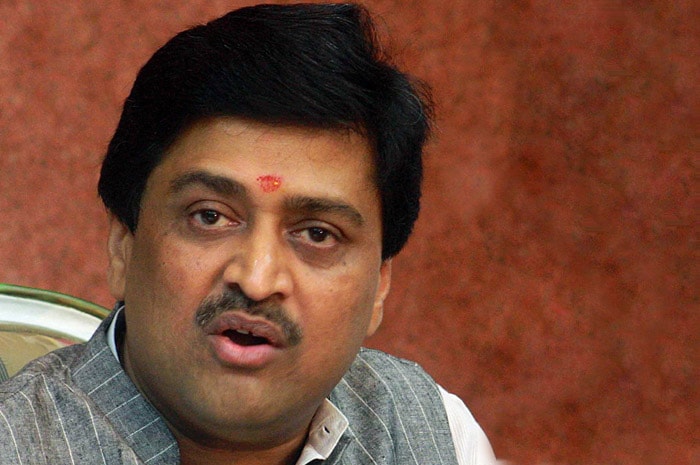 The revelation of improprieties in the allotment of flats cost Ashok Chavan his post as the chief minister of Maharashtra, while it exposed that all the CMs of Maharashtra in the last decade were party to the scam.
The revelation of improprieties in the allotment of flats cost Ashok Chavan his post as the chief minister of Maharashtra, while it exposed that all the CMs of Maharashtra in the last decade were party to the scam.
The Adarsh society had not obtained clearance from the Ministry of Environment. It falls under the coastal regulation zone , where construction is restricted. The investigations indicated that rules were bent and clearances were obtained by gifting flats in the society to officials who cleared the files. -
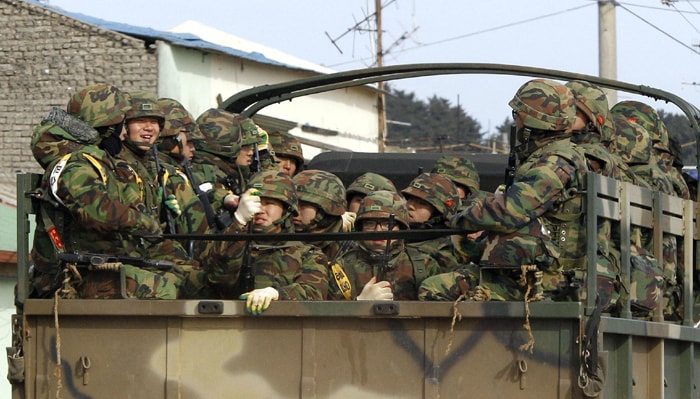 In the fiercest attack in decades, North Korea on November 23 fired scores of shells at a South Korean island killing two civilians, and two soldiers besides injuring several others. The shelling by North Korea near the countries' disputed maritime border prompted South Korea to retaliate.
In the fiercest attack in decades, North Korea on November 23 fired scores of shells at a South Korean island killing two civilians, and two soldiers besides injuring several others. The shelling by North Korea near the countries' disputed maritime border prompted South Korea to retaliate.
South Korea's military was put on the highest non-wartime alert after the shelling by North Korean forces.
UN Secretary General Ban Ki-moon called it one of the "gravest incidents" since the Korean War.
The United States and South Korea began naval exercises in November end that were meant as a warning to North Korea for their provocations, including the deadly artillery attack. -
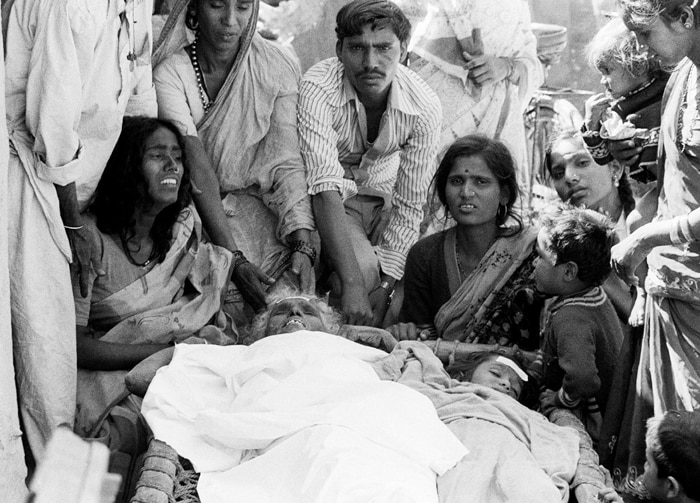 Over 25 years after the world's worst industrial disaster struck Bhopal, the Court finally gave its verdict on June 7 this year. Eight people convicted for the Bhopal industrial disaster were sentenced to two years in prison by a court in Bhopal. However, all of them were granted bail shortly after the judgement was pronounced.
Over 25 years after the world's worst industrial disaster struck Bhopal, the Court finally gave its verdict on June 7 this year. Eight people convicted for the Bhopal industrial disaster were sentenced to two years in prison by a court in Bhopal. However, all of them were granted bail shortly after the judgement was pronounced.
The leak at the Union Carbide plant was the worst industrial disaster in history. Forty tonnes of a toxin called methyl isocyanate leaked from the factory and settled over slums on 3 December 1984. Over 20,000 people were killed within days. The horrific effects of the gas continue to this day.
There is still no word on Warren Anderson, the then Chairman of Union Carbide Corporation of the US, who was declared an absconder after he did not subject himself to trial in the case that began 23 years ago.
On December 3 2010, the Indian government finally filed a plea for compensation. The Centre moved Supreme Court asking for over Rs. 7800 crore for the Bhopal gas tragedy. -
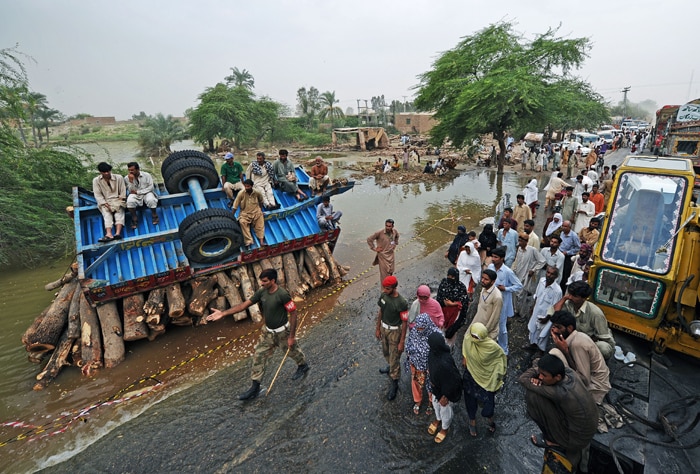 The 2010 Pakistan floods began in July 2010 following heavy monsoon rains in the Khyber Pakhtunkhwa, Sindh, Punjab and Balochistan regions of Pakistan. The devastating floods claimed over 2000 lives and affected a whopping 20 million people.
The 2010 Pakistan floods began in July 2010 following heavy monsoon rains in the Khyber Pakhtunkhwa, Sindh, Punjab and Balochistan regions of Pakistan. The devastating floods claimed over 2000 lives and affected a whopping 20 million people.
Officials estimated the total economic impact to be as much as 43 billion USD.
President Asif Ali Zardari was criticized for going ahead with visits to meet leaders in Britain and France at a time when his nation was facing perhaps its biggest catastrophe. -
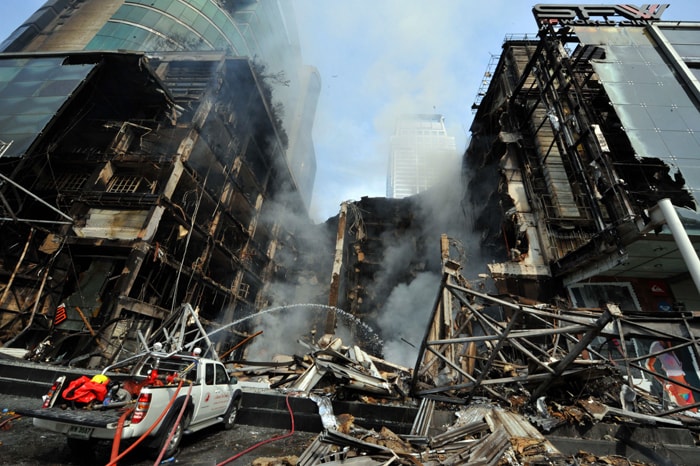 A prolonged series of political protests against the Democrat Party-led government occurred in Bangkok, Thailand from March to May this year. More than 80 civilians were killed and over 2000 people were injured.
A prolonged series of political protests against the Democrat Party-led government occurred in Bangkok, Thailand from March to May this year. More than 80 civilians were killed and over 2000 people were injured.
The protests were organized by the National United Front of Democracy Against Dictatorship who called themselves "Red-Shirts".
The Red-Shirt protesters called for Prime Minister Abhisit Vejjajiva to dissolve parliament and hold elections. They finally surrendered on May 19 after a military crack down. -
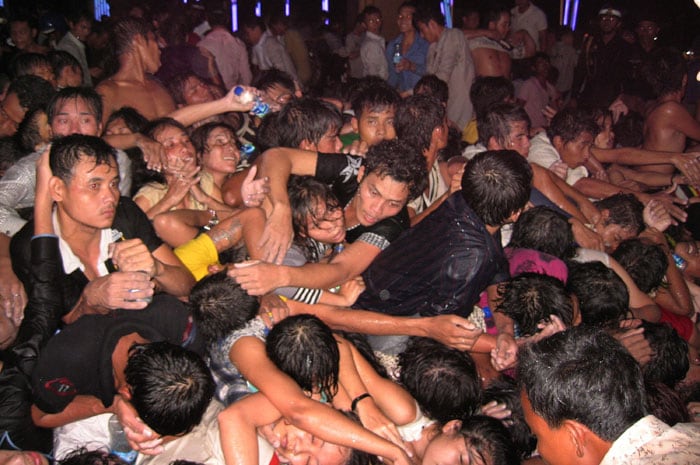 In November this year, Cambodia witnessed its worst tragedy in decades as atleast 378 people died and hundreds more were injured in a stampede at an annual water festival. The stampede began when people panicked in a dense crowd on a small island close to the shore of the Bassac River.
In November this year, Cambodia witnessed its worst tragedy in decades as atleast 378 people died and hundreds more were injured in a stampede at an annual water festival. The stampede began when people panicked in a dense crowd on a small island close to the shore of the Bassac River.
Hundreds of people tried to go across a short suspension bridge. Many died of suffocation, were crushed underfoot, or were electrocuted by loose wires. Many drowned when they leapt from the suspension bridge into the water.
Millions of people pour into the city each year and line the river's shores and islands in densely packed crowds for a boat race that is the climax of the water festival. -
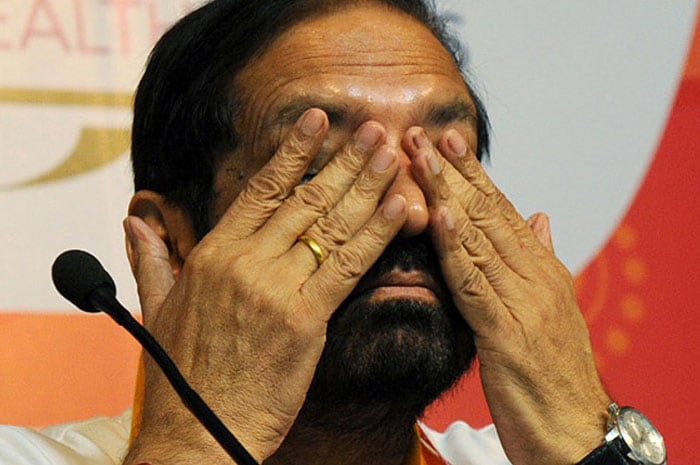 The Commonwealth Games, held in New Delhi from October 3 to October 14, brought embarrassment for India on the one hand and on the other it was also the source of pride with India's medal tally being the best ever.
The Commonwealth Games, held in New Delhi from October 3 to October 14, brought embarrassment for India on the one hand and on the other it was also the source of pride with India's medal tally being the best ever.
In the months leading to the Games, the Organising Committee chairman Suresh Kalmadi had to face the heat as there were allegations of misappropriation of funds, impropriety in awarding the contracts and delays in the completion of projects.
Finally on the opening day of the winter session of Parliament on November 9 this year, Congress axed Suresh Kalmadi as secretary of its Parliamentary Party, seeking to distance itself from him in the wake of allegations of corruption. -
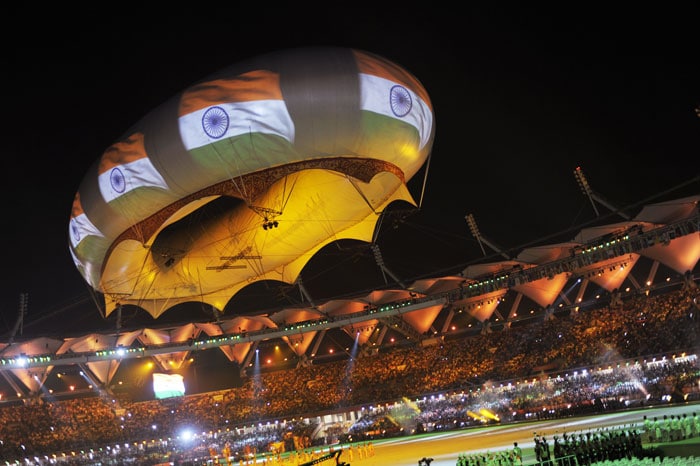 As the curtains for the opening ceremony were thrown open, all the fears about under preparation were laid to rest as the world witnessed a spectacular glimpse into India's culture and tradition. The centerpiece of the show was an aerostat which is said to be the biggest helium balloon in the world. Being suspended 25 metres above the ground, the aerostat was used in an entertainment event for the very first time. The aerostat had video content being projected on it, which was synchronised with the events taking place during the opening ceremony.
As the curtains for the opening ceremony were thrown open, all the fears about under preparation were laid to rest as the world witnessed a spectacular glimpse into India's culture and tradition. The centerpiece of the show was an aerostat which is said to be the biggest helium balloon in the world. Being suspended 25 metres above the ground, the aerostat was used in an entertainment event for the very first time. The aerostat had video content being projected on it, which was synchronised with the events taking place during the opening ceremony.
The 19th Commonwealth Games proved to be the most successful games ever for the country, with India standing second in the medal tally winning 101 medals in total, with 38 golds. The Games were officially declared close with handover to Scotland which are to host the next games. -
 This year Chile pulled off the most spectacular rescue mission the world had seen in a long time. It was a story of hope and miracles.
This year Chile pulled off the most spectacular rescue mission the world had seen in a long time. It was a story of hope and miracles.
On August 5, 33 Chilean miners were trapped by a massive collapse in the roof of the mine located outside the northern Chilean city of Copiapó. For 17 days they were all but given up for dead, before a drill probe found them and they were able to attach a note to it, announcing the extraordinary news that they were all well and alive.
All 33 miners, trapped underground for 69 days, were finally rescued on October 14. Instead of the estimated 36-48 hours, the rescue operation was completed in 22 hours, 37 minutes. -
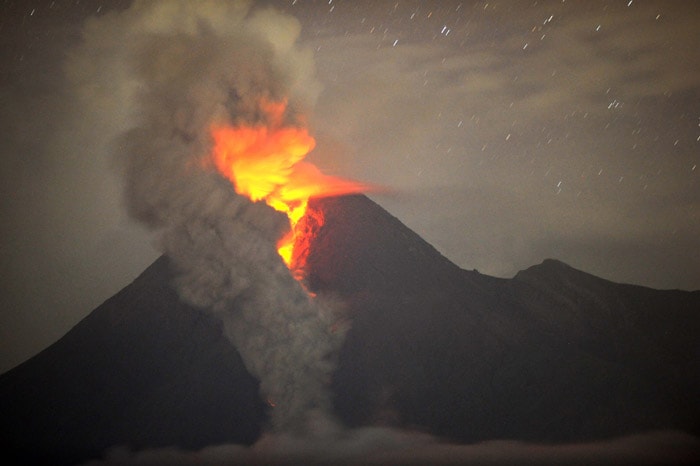 Mount Merapi in Central Java, Indonesia started erupting in late October 2010. The extremely violent series of eruptions continued till November end.
Mount Merapi in Central Java, Indonesia started erupting in late October 2010. The extremely violent series of eruptions continued till November end.
Though volcanic eruptions are not uncommon in Indonesia, these volcanic eruptions were said to be the largest since the 1870s.
Over 350 people were killed, thousands were injured and lakhs had to evacuate their homes. The eruptions and subsequent volcanic ash plumes caused extensive disruption to aviation movements across central and western Java. -
 In the month of July, Delhi got a swanking new world-class Rs 9,000 crore airport at the nation's capital that will integrate domestic and international operations. Terminal 3 or T3 as the new airport building is called, is the 5th largest airport terminal in the world and is expected to handle 34 million passengers annually.
In the month of July, Delhi got a swanking new world-class Rs 9,000 crore airport at the nation's capital that will integrate domestic and international operations. Terminal 3 or T3 as the new airport building is called, is the 5th largest airport terminal in the world and is expected to handle 34 million passengers annually. -
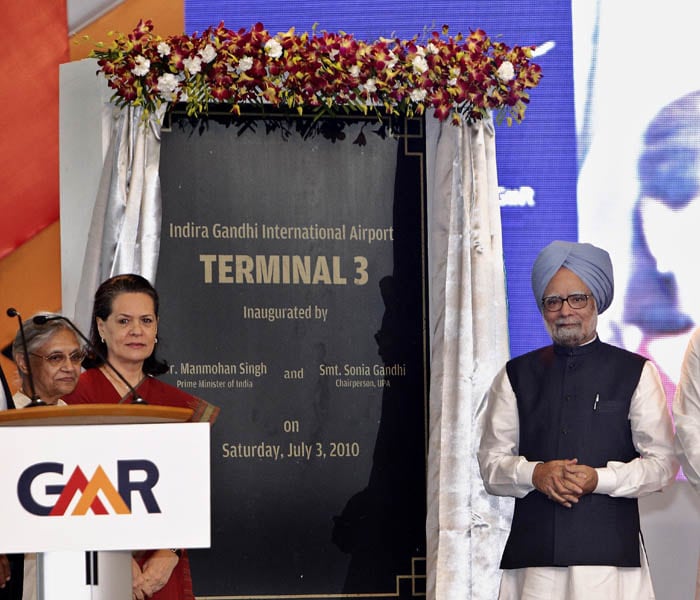 Prime Minister Manmohan Singh inaugurated the Terminal 3 at the Indira Gandhi International airport in New Delhi on July 3. UPA Chairperson Sonia Gandhi, Civil Aviation Minister Praful Patel and Delhi Chief Minister Sheila Dikshit were among the dignitaries present on the occasion to dedicate T3 built by GMR group backed developer Delhi International Airport Ltd (DIAL). The Prime Minister said Delhi's new airport proves the success of public-private partnership model in execution of large infrastructure projects.
Prime Minister Manmohan Singh inaugurated the Terminal 3 at the Indira Gandhi International airport in New Delhi on July 3. UPA Chairperson Sonia Gandhi, Civil Aviation Minister Praful Patel and Delhi Chief Minister Sheila Dikshit were among the dignitaries present on the occasion to dedicate T3 built by GMR group backed developer Delhi International Airport Ltd (DIAL). The Prime Minister said Delhi's new airport proves the success of public-private partnership model in execution of large infrastructure projects. -
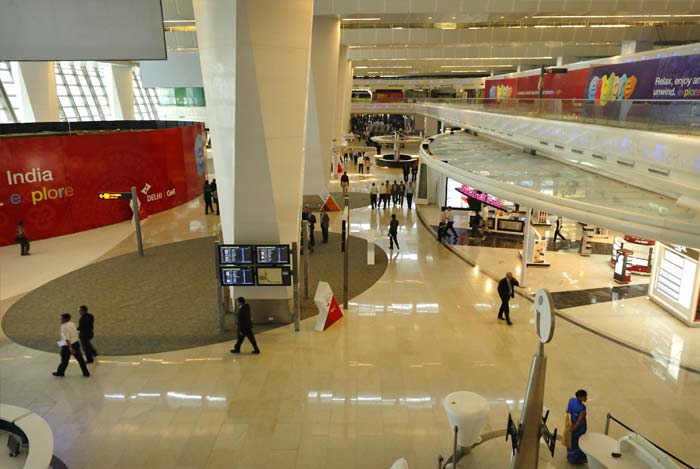 Spread over 4 kms, 80 per cent of T3 is made of glass and supported by metal frames. The nine level terminal building ia used for 90 per cent of the entire passenger movement in the airport. Comfortable lounges, nap and shower rooms adds to passenger comfort in the airport that also has a mix of restaurants, bars, cafes and fast food outlets in around 20,000 sq mt of commercial space.
Spread over 4 kms, 80 per cent of T3 is made of glass and supported by metal frames. The nine level terminal building ia used for 90 per cent of the entire passenger movement in the airport. Comfortable lounges, nap and shower rooms adds to passenger comfort in the airport that also has a mix of restaurants, bars, cafes and fast food outlets in around 20,000 sq mt of commercial space. -
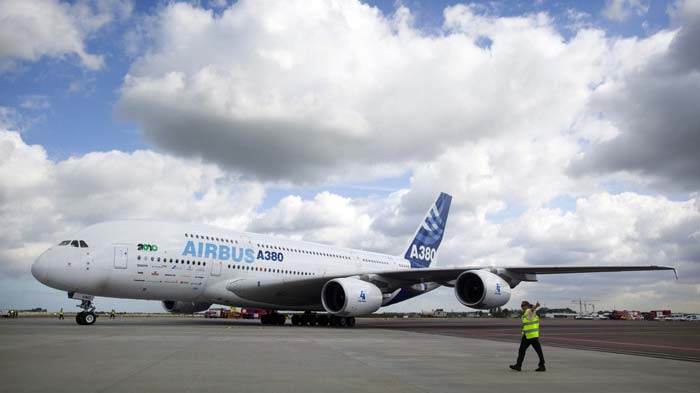 The world's largest passenger aircraft A-380 made its maiden flight in India. An Emirates Airbus A380 flew in from Dubai with over 500 passengers, marking the aircraft's arrival at the Terminal-3 (T3) of Delhi's Indira Gandhi International Airport (IGIA) on July 15, 2010. The massive bird that flew into the Indian skies for the very first time attracted huge crowds.
The world's largest passenger aircraft A-380 made its maiden flight in India. An Emirates Airbus A380 flew in from Dubai with over 500 passengers, marking the aircraft's arrival at the Terminal-3 (T3) of Delhi's Indira Gandhi International Airport (IGIA) on July 15, 2010. The massive bird that flew into the Indian skies for the very first time attracted huge crowds.
The 517-seat A-380 offers 14 flat-bed First Class Private Suites with electrically operated doors, 76 fully-flat seats in Business Class - all with mini bars and aisle access, and 427 comfortable contoured seats in Economy - spread across four roomy cabins on the lower deck. A personal satellite phone is fitted to each seat on the A380 aircraft, which also carries a seat-back SMS and email service, along with seat to seat calling and a "My USB" personal picture viewing facility. -
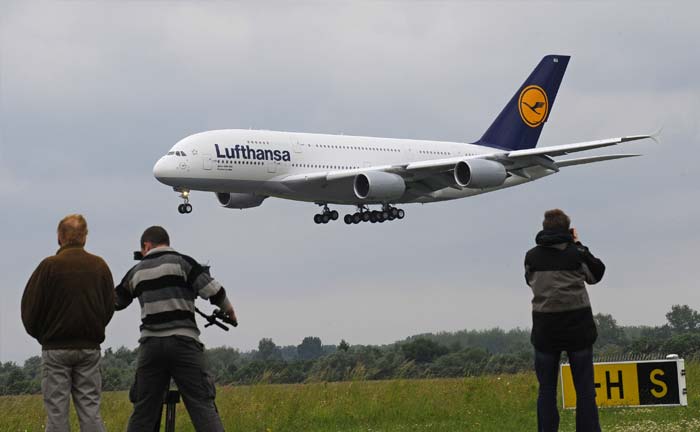 The Airbus A380 was hit by safety concerns after a Rolls-Royce engine partly disintegrated mid-flight, forcing a fully laden Qantas plane to make an emergency landing on November 4. London-based Rolls-Royce asked Airbus EAD to return some Airbus A380 engines from production lines so it can use them to replace faulty ones on airplanes already in service. Airlines using the Rolls-Royce Trent 900 engines have been ordered by European aviation authorities to undertake major tests.
The Airbus A380 was hit by safety concerns after a Rolls-Royce engine partly disintegrated mid-flight, forcing a fully laden Qantas plane to make an emergency landing on November 4. London-based Rolls-Royce asked Airbus EAD to return some Airbus A380 engines from production lines so it can use them to replace faulty ones on airplanes already in service. Airlines using the Rolls-Royce Trent 900 engines have been ordered by European aviation authorities to undertake major tests. -
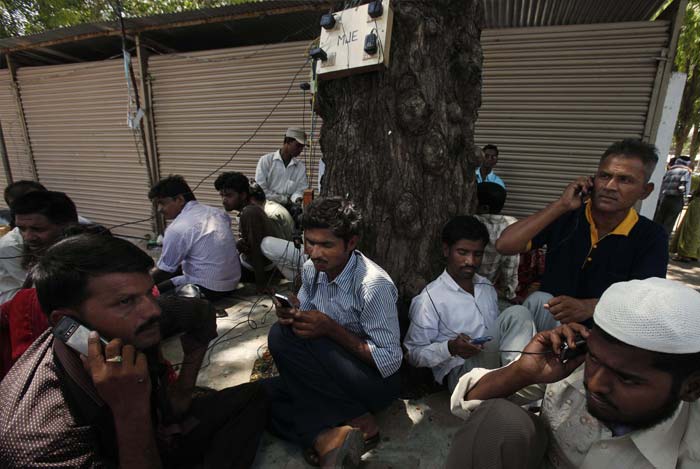 Communications minister Kapil Sibal on November 25 launched the eagerly-awaited mobile number portability scheme in Haryana to allow cellphone users to change their operators while retaining existing numbers. Mobile number portability will be available nationwide starting January 20, 2011. The scheme has been delayed several times. Initially, it was to be implemented by Dec 31, 2009 in all the metros.
Communications minister Kapil Sibal on November 25 launched the eagerly-awaited mobile number portability scheme in Haryana to allow cellphone users to change their operators while retaining existing numbers. Mobile number portability will be available nationwide starting January 20, 2011. The scheme has been delayed several times. Initially, it was to be implemented by Dec 31, 2009 in all the metros.
For using the mobile number facility the customers will have to pay a maximum of Rs 19 to the new operator for porting his number. However the minimum stay period for a customer to retain the new operator will be three months. -
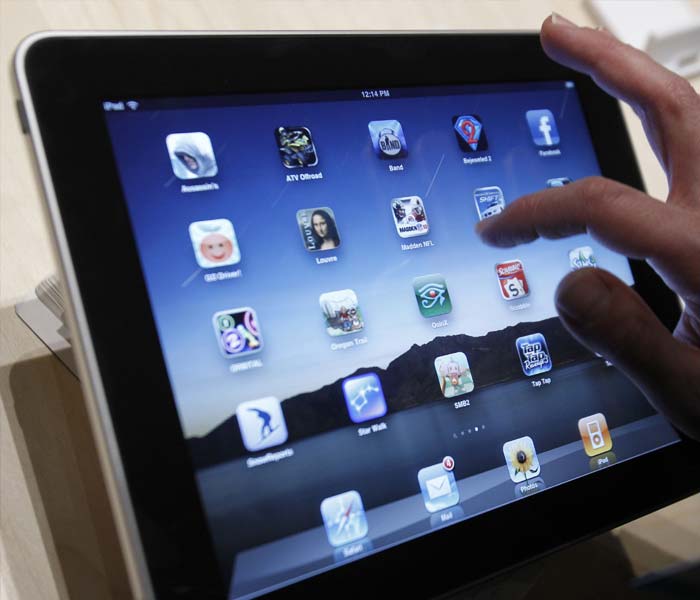 Apple began selling its much-anticipated iPad on April 3, drawing huge consumer interest into a new class of tablet-style computers. The iPad is essentially a much larger version of Apple's popular iPhone, without the calling capabilities. The iPads are priced ranging from US$499 to $699, depending on storage capabilities, which range from 16GB to 64GB
Apple began selling its much-anticipated iPad on April 3, drawing huge consumer interest into a new class of tablet-style computers. The iPad is essentially a much larger version of Apple's popular iPhone, without the calling capabilities. The iPads are priced ranging from US$499 to $699, depending on storage capabilities, which range from 16GB to 64GB
Apple iPad is half-inch thick, weighs 1.5 pounds and has a touch screen that measures 9.7 inches. The iPad comes with basic applications, including a web browser, e-mail program, YouTube video player and a mapping program. -
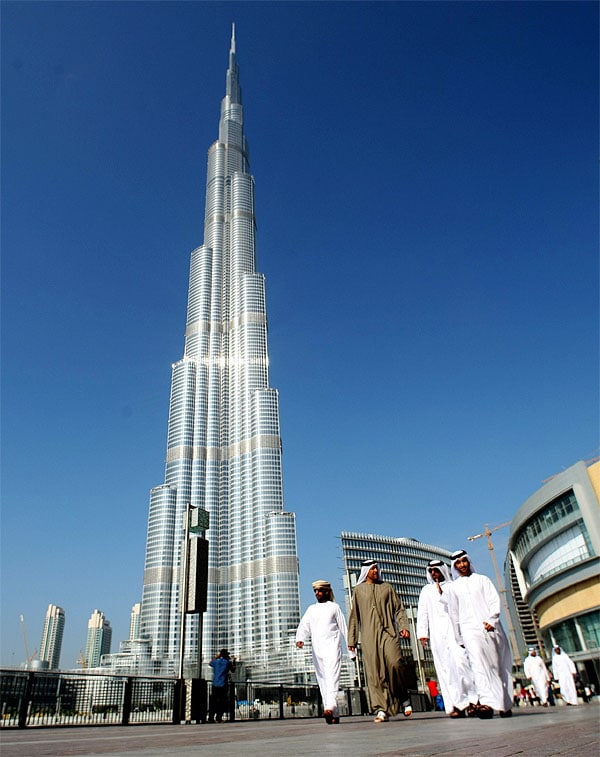 Burj Khalifa (formerly known as the Burj Dubai) – the tallest building in the world and the magnificent centerpiece of downtown Dubai – opened on January 4, 2010.
Burj Khalifa (formerly known as the Burj Dubai) – the tallest building in the world and the magnificent centerpiece of downtown Dubai – opened on January 4, 2010.
The Burj Khalifa is the tallest man-made structure ever built, at 828 meters (2,716ft) high, far taller than the previous record holder, Taipei 101, costing a whopping $1.5 billion. The total area of the tower is 526.760 square meters, and has 49 levels for offices, 1044 residential apartments and a luxury hotel "Armani hotel,” in addition to many shops and restaurants.
Burj Khalifa is the place of residence, work and leisure for a community of up to 12,000 people. Clad in 28,000 glass panels, the tower has 160 floors and it also claims to have the highest occupied floor, the tallest service lift, and the world's highest observation deck - on the 124th floor. -
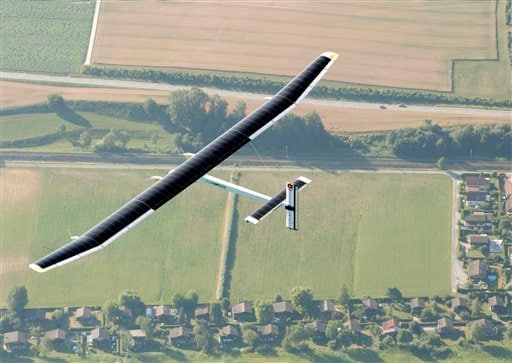 On July 7, 2010, Solar Impulse made its first day into night flight; flying for a whole 26 hours! It flew at 27,000 feet during the day where it stored all of its energy.
On July 7, 2010, Solar Impulse made its first day into night flight; flying for a whole 26 hours! It flew at 27,000 feet during the day where it stored all of its energy.
Solar Impulse is a European long-range solar powered plane flying completely on solar power through photovoltaics. The plane consists of 12,000 solar cells that run four electric engines. For the past seven years the Swiss and Germans have been working and developing this plane. -
 On April 20, 2010, the global energy company of BP's oil rig, Deepwater Horizon, suffered an explosion causing a massive amount of oil to spill into the Gulf. Within a short span of 2-3 days, the oil leakage was dumping about 100,000 barrels of oil into the water every day. The US govenrment described the oil leakage as the worst environmental disaster in US history.
On April 20, 2010, the global energy company of BP's oil rig, Deepwater Horizon, suffered an explosion causing a massive amount of oil to spill into the Gulf. Within a short span of 2-3 days, the oil leakage was dumping about 100,000 barrels of oil into the water every day. The US govenrment described the oil leakage as the worst environmental disaster in US history.
The unprecedented oil spill in Gulf of Mexico 2010 threatened hundreds of species of fish, birds and other wildlife in one of the world's richest marine environments.
Nearly three months after the spill happened, the British major succeeded in stopping leakage of oil into sea. BP in a statement said the cost of response to date amounts to approximately $3.95 billion, including the cost of the spill response, containment, relief well drilling, grants to the Gulf states, claims paid and federal costs. In the wake of intense pressure from the US government, BP last month had announced a $20 billion fund that would be utilised to meet obligations arising out of the spill. -
 Antilla - Mukesh Ambani's new home
Antilla - Mukesh Ambani's new home
Soaring high at the heart of India's financial capital Mumbai is Antilla, the new home of Reliance Industries chairman Mukesh Ambani. It is estimated to have been built at a cost of around a billion dollar and is said to be the most expensive house in the world. The 27-storey building is located in the expensive Mumbai suburb of Malabar Hill and has underground parking for 160 cars, and requires some 600 staff to run. -
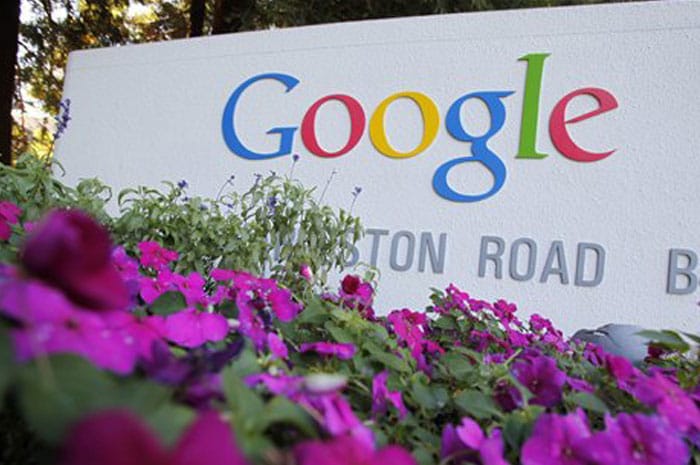 Google's battle in China
Google's battle in China
Three years after Internet search engine giant Google stepped into China, the Internet company announced that it may pull out of China because of a sophisticated computer network attack originating there and targeting its e-mail service and corporate infrastructure. Google and the Chinese government had for months been locked in a battle over state censorship and cyber attacks that the company said originated in China, the world's largest online market with 420 million users.
On March 22, Google shut down its Beijing offices to resist censorship. In exiting Beijing, Google activated a mechanism that automatically redirected any Chinese user navigating to Google.cn to its website in Hong Kong, which is run by China but does not impose censorship. But, Google's move to stop redirecting Google.cn to Hong Kong paid off as the company announced that Beijing has renewed Google's licence in a move that allows the web giant to continue operating in China. -
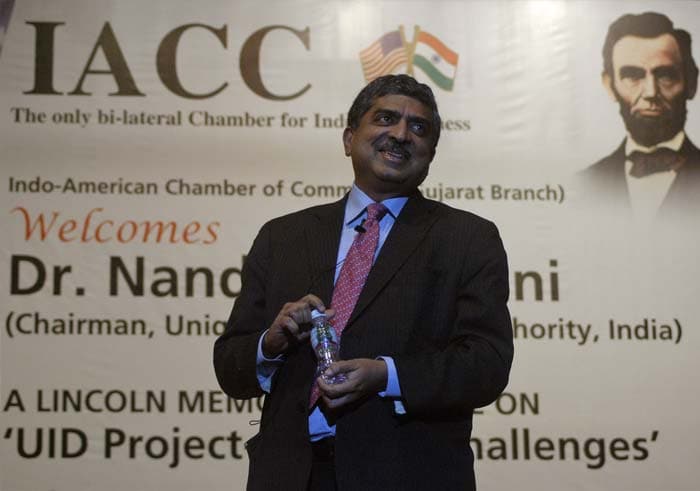 Ten adivasis from the tribal hamlet of Tembhli in Maharashtra became the first to receive the Unique Identity Numbers from Prime Minister Manmohan Singh and Congress chief Sonia Gandhi, who said this would help the poor get the benefits of welfare projects.
Ten adivasis from the tribal hamlet of Tembhli in Maharashtra became the first to receive the Unique Identity Numbers from Prime Minister Manmohan Singh and Congress chief Sonia Gandhi, who said this would help the poor get the benefits of welfare projects.
The Unique Identification Database project (UID) project, christened 'Aadhaar' was handed over to Nandan Nilekani in 2009. Dr Singh praised ex-Infosys chief Nandan Nilekani for his work on the project and rolling it out in a short span of time. -
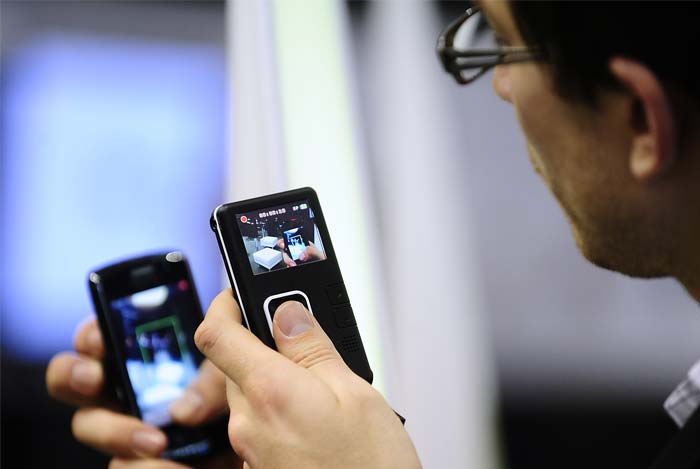 The auction of third-generation (3G) spectrum garnered nearly Rs 68,000 crore as against the earlier target of Rs 35,000 crore. Nine telecom players, including BSNL, MTNL, Bharti, Vodafone and RCom, paid Rs 67,719 crore to the government towards 3G spectrum.
The auction of third-generation (3G) spectrum garnered nearly Rs 68,000 crore as against the earlier target of Rs 35,000 crore. Nine telecom players, including BSNL, MTNL, Bharti, Vodafone and RCom, paid Rs 67,719 crore to the government towards 3G spectrum.
Bharti Airtel paid the highest Rs 12,295.46 crore for 3G spectrum in 13 circles, followed by Vodafone Rs 11,617.86 crore. State-owned BSNL also paid Rs 10,186.56 crore for the radio waves across India, except in Delhi and Mumbai. -
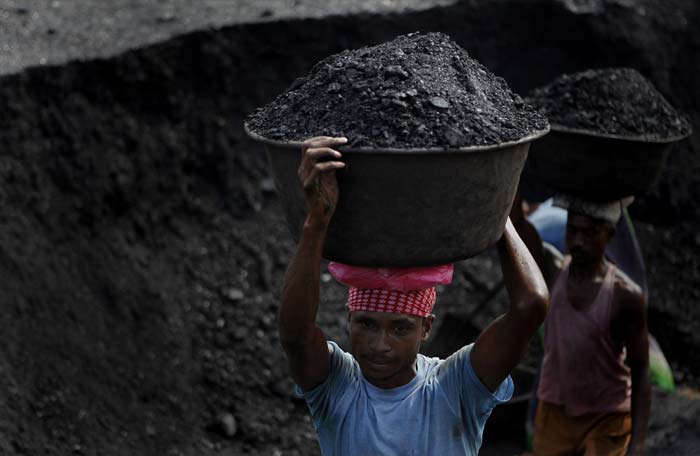 Coal India mega IPO was the largest ever issue that the Indian market has seen, raising over Rs 15,500 crore. The issue was priced at Rs 245, with a 5 per cent discount for retail investors, and was subscribed more than 15 times on account of huge demand for retail and institutional investors.
Coal India mega IPO was the largest ever issue that the Indian market has seen, raising over Rs 15,500 crore. The issue was priced at Rs 245, with a 5 per cent discount for retail investors, and was subscribed more than 15 times on account of huge demand for retail and institutional investors.
The world's largest coal producer Coal India made a handsome debut on the bourses and ended up nearly 43 per cent rise within 2 days of its listing on the bourses. -
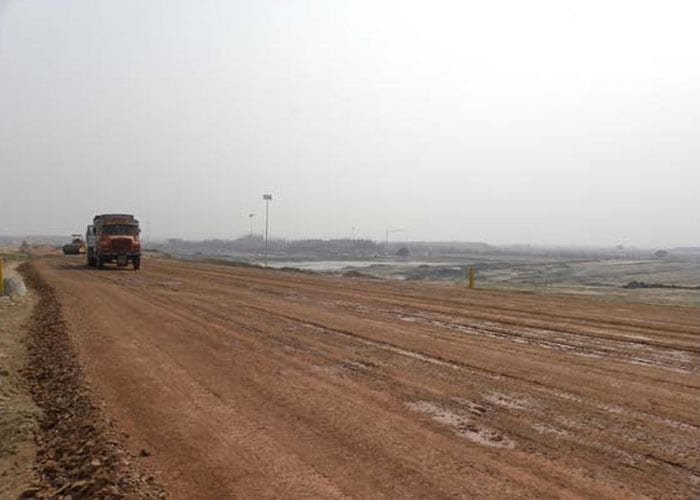 India is all set for its Formula One debut in 2011 after FIA, the motor racing's governing body confirmed the Indian Grand Prix in October 2011.
India is all set for its Formula One debut in 2011 after FIA, the motor racing's governing body confirmed the Indian Grand Prix in October 2011.
The event is set to be the first Formula 1 race in India after almost a decade passed in an attempt to get a grand prix in the country.
Noida, in the state of Uttar Pradesh in the northern part of India, has been chosen as the site for the track. A circuit was proposed in various states earlier including one near the city of Hyderabad in 2003 and near Mumbai.
India now has had two Formula 1 drivers in the sport, Narain Karthikeyan and Karun Chandhok, a team in Force India and now its first ever F1 track in the Jaypee Group Circuit, Noida.
The construction of the venue is expected to be completed by 2011 July and, subject to FIA homologation, will host its first race on October 30th, 2011. -
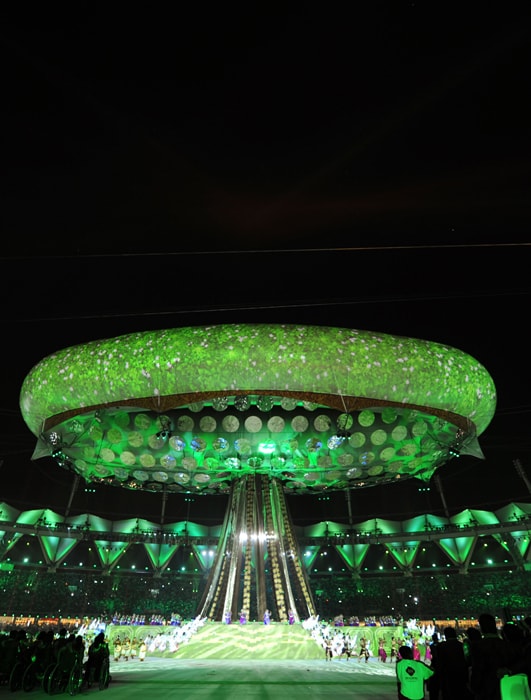 Being the host of the XIX Commonwealth Games, India had a double responsibility to fulfill. One, it had to play the perfect host against all odds and conduct what it had promised to be the best Games in the history, and two it had to make its presence felt on the field as well as in the medals table. And India managed to fulfill both the jobs impressively.
Being the host of the XIX Commonwealth Games, India had a double responsibility to fulfill. One, it had to play the perfect host against all odds and conduct what it had promised to be the best Games in the history, and two it had to make its presence felt on the field as well as in the medals table. And India managed to fulfill both the jobs impressively.
A record medal haul of 101 medals - 38 gold, 27 silver and 36 bronze medals, the best-ever harvest for the country in the Games' history, helped India climb to the record-high second position and end the multi-discipline event on a thumping note.
The main haul of these 101 medals came from the shooting range, wrestling mat, boxing ring, archery range and, to everyone's surprise, the track and field events.
Rifle-shooting ace Gagan Narang scooped up four gold medals. The three Boxing gold medals - won through Suranjoy Singh (52kg), Manoj Kumar (64kg) and Paramjeet Samota (+91kg) – were unprecedented for India, for whom previously only Mohd Ali Qamar (2002) and Akhil Kumar (Melbourne, 56kg) had finished on top.
Then there was the teenage woman archer Deepika Kumari, daughter of an auto-rickshaw driver, who held her nerves even as the more seasoned Dola Banerjee wilted, to come up with a golden double in the women's recurve event.
India achieved unprecedented success in athletics by bagging 12 medals, including two gold, but a dope flunk took away some of the sheen off the glorious feat in the Games. -
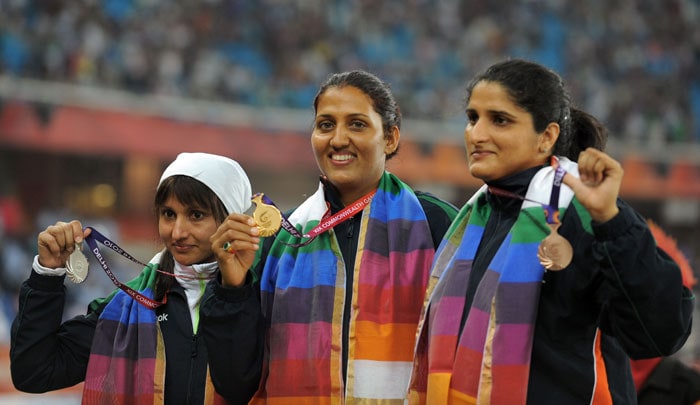 The track and field events witnessed India's first gold medal in 52 years when Krishna Poonia led a clean sweep of the women's discus throw, Harwant Kaur and Seema Antil winning the silver and bronze. Later, the women's 4x400m relay squad also struck an unexpected gold with a superb display that pushed Nigeria and England to second and third places.
The track and field events witnessed India's first gold medal in 52 years when Krishna Poonia led a clean sweep of the women's discus throw, Harwant Kaur and Seema Antil winning the silver and bronze. Later, the women's 4x400m relay squad also struck an unexpected gold with a superb display that pushed Nigeria and England to second and third places.
The hosts won 30 shooting medals including 14 golds, 11 silver and five bronze medals in the Games. Of those, only three came from the shotgun range.
If Indian marksmen were the primary contributors to country's rich medal haul, the wrestling contingent was not far behind. They won 19 medals in the 21 designated event. Among the 19 medals, there were 10 gold, five silver and four bronze medals. -
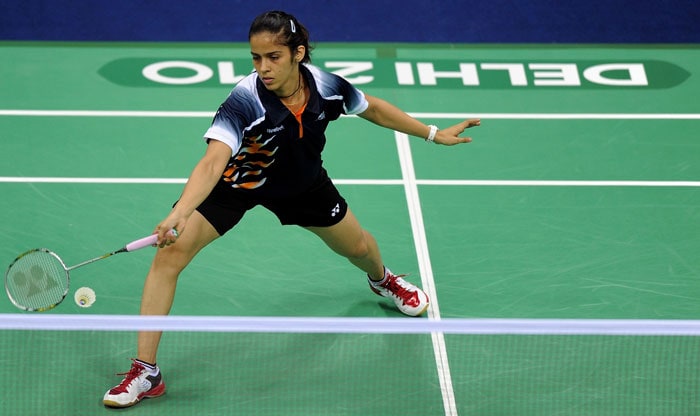 If Sushil Kumar literally walked his way to gold, the women wrestlers participating in the Games for the first time stole the show with a memorable performance. In the six events for women, India won three gold medals, two silver medals and a bronze to show their supremacy in the freestyle category.
If Sushil Kumar literally walked his way to gold, the women wrestlers participating in the Games for the first time stole the show with a memorable performance. In the six events for women, India won three gold medals, two silver medals and a bronze to show their supremacy in the freestyle category.
The trio of Alka Tomar, Geeta and Anita won their final bouts with ease, while Babita Kumari and Nirmala Devi missed out on yellow metal losing their final rounds but their performance drew praise from none other than superstar of Indian wrestling -- Sushil.
Just when the titles seemed to be drying up at the end, the women shuttlers, led by this year's Rajiv Gandhi Khel Ratna awardee Saina Nehwal, brought down two gold medals to bring down the curtains on the country's competitive show with a bang. Those two gold medals in badminton were vital to help India push England to the third place by the skin of their teeth, India's gold tally becoming 38 on the last day after they trailed their rivals going into the final day.
On the organisational front, after the shambolic build-up that included a filthy Games village and other shortcomings leading to threats of pull-out by leading competing nations, India managed to pull off the event smoothly.
"Delhi has performed and the overall image of the Games has been extremely positive", Commonwealth Games Federation chief Michael Fennell had said on the last day of the multi-discipline event. -
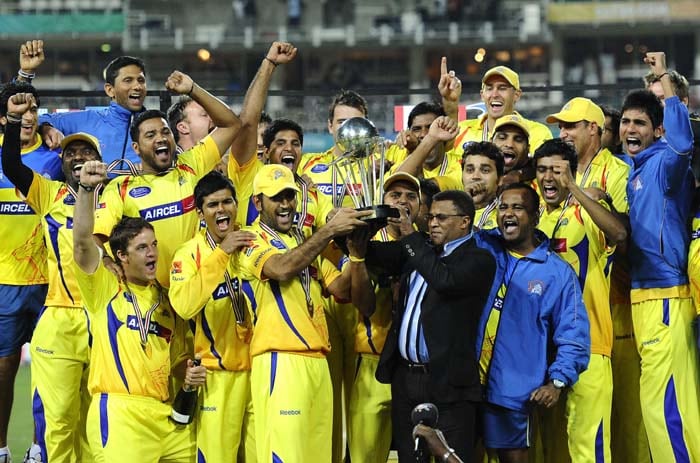 In the second edition of the Champions League T20, a tournament which has Twenty20 champions and the first runner-ups from different countries competing for the coveted trophy, ten teams took part. They were Central Stags (New Zealand), Chennai Super Kings (India), Mumbai Indians (India), Royal Challengers Bangalore (India), Victorian Bushrangers (Australia), Highveld Lions (South Africa), Guyana (West Indies), Wayamba Elevens (West Indies), South Australian Redbacks (Australia), Warriors (South Africa).
In the second edition of the Champions League T20, a tournament which has Twenty20 champions and the first runner-ups from different countries competing for the coveted trophy, ten teams took part. They were Central Stags (New Zealand), Chennai Super Kings (India), Mumbai Indians (India), Royal Challengers Bangalore (India), Victorian Bushrangers (Australia), Highveld Lions (South Africa), Guyana (West Indies), Wayamba Elevens (West Indies), South Australian Redbacks (Australia), Warriors (South Africa).
Three teams from India (IPL) participated. And while Royal Challengers Bangalore made it to the semi-finals, it was the 2010 IPL winners Chennai Super Kings who won the championship in style under MS Dhoni's captaincy.
Sachin Tendulkar-led Mumbai Indians failed to make it to the last four. -
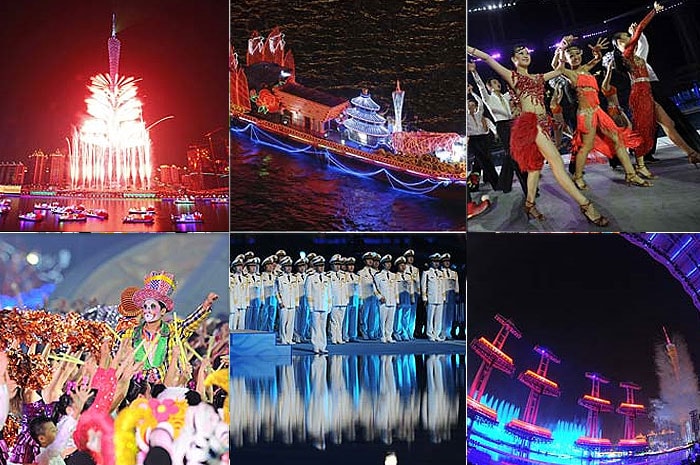 It was China's might and splendor on display at the 16th Asian Games in Guangzhou, though it was more sober and subtle than what we saw during the 2008 Olympics in Beijing.
It was China's might and splendor on display at the 16th Asian Games in Guangzhou, though it was more sober and subtle than what we saw during the 2008 Olympics in Beijing.
Hosts China were unstoppable in their relentless march to titles and at the end of the Games had an incredible harvest of 199 golds in an overall haul of over 400 medals, proving once again that they are in the top-most echelons of world sports.
Korea finished way behind in second place while Japan were third that underlined the fact that the Asian Games, the second largest sports event after the Olympic Games, are still being overwhelmingly dominated by the far eastern nations of the continent. -
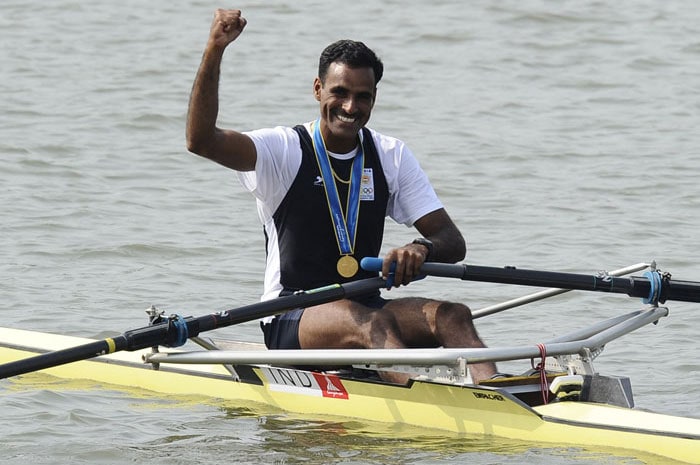 As for India, it finished its campaign on the sixth position with 14 gold, bettering the 13 won at home in Delhi 28 years ago, 17 silver and 33 bronze medals. The total medal haul of 64 was also the highest for India in Asiad history as it bettered the 1982 haul in Delhi of 57 comprising 13-19-25.
As for India, it finished its campaign on the sixth position with 14 gold, bettering the 13 won at home in Delhi 28 years ago, 17 silver and 33 bronze medals. The total medal haul of 64 was also the highest for India in Asiad history as it bettered the 1982 haul in Delhi of 57 comprising 13-19-25.
The Asian Games, the second largest after the Olympics, showed starkly that the majority of the Indian contingent had no credentials to compete at this level. The shooters and wrestlers, who were the toast of the nation at the CWG, put up a flop show and had the thunder stolen from them by the athletes, boxers, India's number one tennis player Somdev Devvarman and also the kabaddi men and women teams.
The other creditable stories came from the archery range, where Tarundeep Rai bagged India's first ever individual medal a silver, rower Bajrang Lal Takhar who won India's first ever gold in the discipline and that too with borrowed boats. -
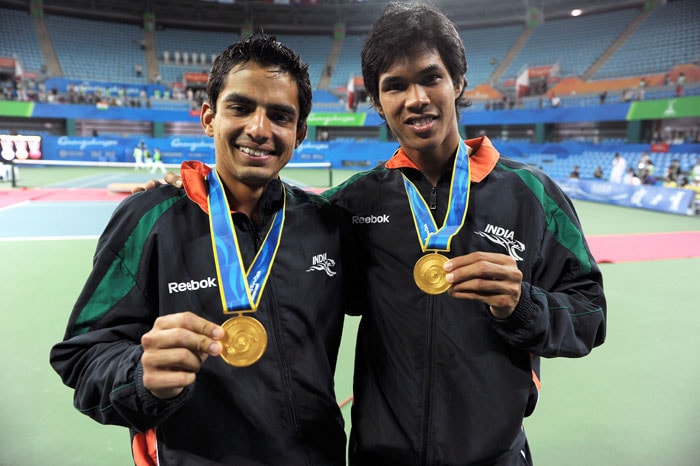 The success stories of gymnast Ashish Kumar, who won the floor exercise bronze for the first-ever medal in the sport, and swimmer Virdhwal Khade, who won men's 50m butterfly bronze, were also memorable.
The success stories of gymnast Ashish Kumar, who won the floor exercise bronze for the first-ever medal in the sport, and swimmer Virdhwal Khade, who won men's 50m butterfly bronze, were also memorable.
Adding to the list of failures was ace woman shuttler Saina Nehwal, double-gold winner in CWG, who came a cropper as the second seed in the singles event.
Tennis star Somdev showed stupendous stamina, determination and killer instinct to win the men's singles and doubles gold medals. -
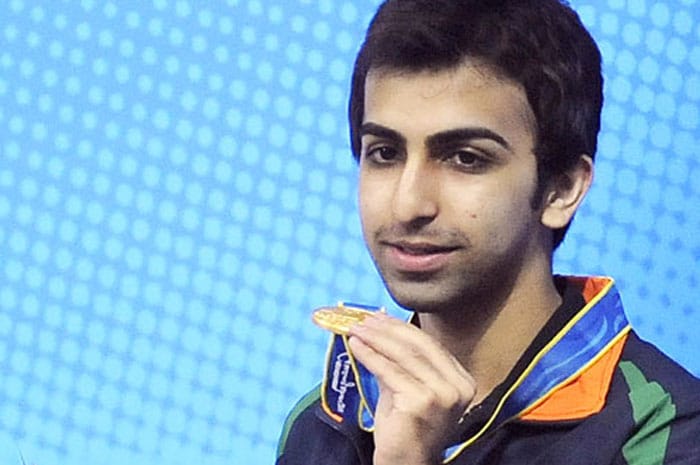 While former two-time world professional champion Pankaj Advani expectedly retained his gold medal which was the first and only one for India till shooter Ronjan Sodhi added to the list by winning the men's double trap title, the rowing gold by Takhar was a surprise one.
While former two-time world professional champion Pankaj Advani expectedly retained his gold medal which was the first and only one for India till shooter Ronjan Sodhi added to the list by winning the men's double trap title, the rowing gold by Takhar was a surprise one.
Overall the shooters garnered one gold, three silver and four bronze medals, two of those from pistol shooter Vijay Kumar a complete let-down from their super tally of 14-11-5 in the Delhi Games.
The men's kabaddi team clinched its sixth straight gold but had to subdue a fighting Iran after the women clinched the maiden title beating Thailand comfortably. -
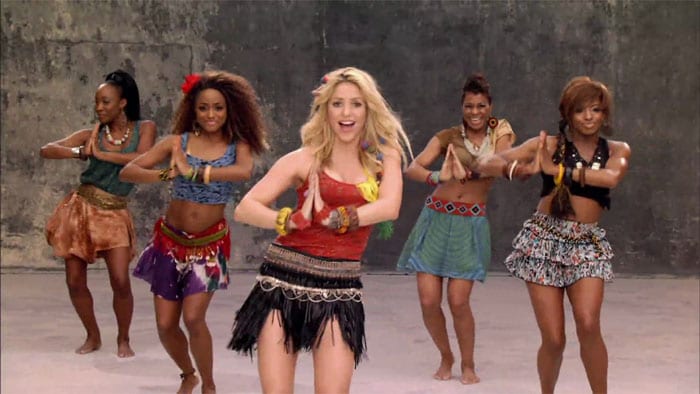 Football is by far the most popular sport on the planet and every four years the entire world comes together to celebrate 'greatness on the greens' as it is time for the FIFA World Cup. The biggest single sport extravaganza which generates excitement and interest like no other sporting event.
Football is by far the most popular sport on the planet and every four years the entire world comes together to celebrate 'greatness on the greens' as it is time for the FIFA World Cup. The biggest single sport extravaganza which generates excitement and interest like no other sporting event.
This year the tournament was held for the first time in the continent of Africa with South Africa as the grand hosts. The stage was set for the best players in the world to display their skills and finesse and Shakira's anthem 'Waka Waka' set the ball rolling.
The pacy opening match between hosts South Africa and Mexico set the tone for the tournament. The preliminary group stage turned out to be a mixed bag as it threw out many surprises with defending champions Italy and 2006 runners-up France biting the dust in the very first round after some lacklusture performances. -
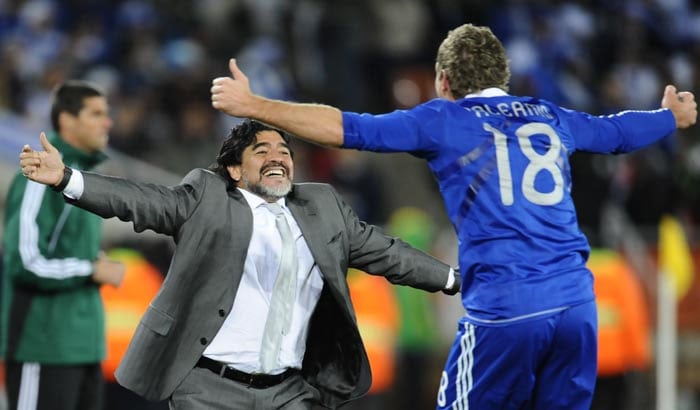 Argentina looked flawless under the guidance of the great Diego Maradona and the youthful exuberance of Germany got everyone to get up and take notice of the young stars.
Argentina looked flawless under the guidance of the great Diego Maradona and the youthful exuberance of Germany got everyone to get up and take notice of the young stars.
Brazil looked solid in their quest for a sixth title while pre-tournament favourites Spain marched through after an opening match fiasco against the Swiss.
Netherlands were less impressive in their style of play but were one of the few teams to keep a 100% record. England scrapped through but not before scathing criticism from fans and pundits alike. Slovakia, Paraguay and Ghana were the surprise packages in the last 16. -
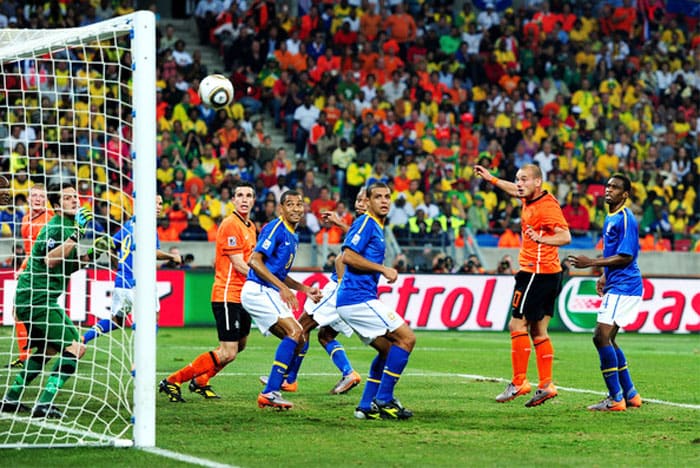 The first knock-out round though produced the expected results as most of the favourites advanced to the quarter-finals. The highlight of the round was Germany's 4-1 demolition of England in a match which saw an English goal disallowed by the referee.
The first knock-out round though produced the expected results as most of the favourites advanced to the quarter-finals. The highlight of the round was Germany's 4-1 demolition of England in a match which saw an English goal disallowed by the referee.
Uruguay and Ghana met in the first quarter-final and Asamoah Gyan blew away a last minute chance from the penalty spot to make Ghana the first African nation to enter the World Cup semis. The ensuing shoot-out saw Uruguay win.
Spain too entered the semis with a clinical 1-0 win over the Paraguayans. But the biggest upset of the round was Netherland's 2-1 comeback win over favourites Brazil. An inspired performance from midfield dynamo Wesley Sneijder put the 'Oranje' through to the semis. Diego Maradona's World Cup dream also lay in tatters as Germany bulldozed them 4-0. -
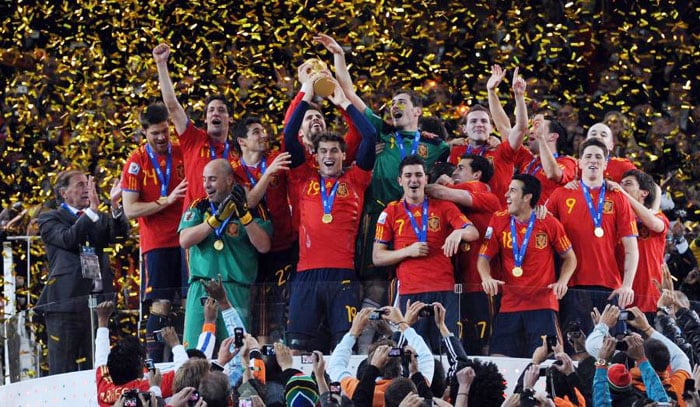 Netherlands entered their first World Cup final after 32 years with a 3-2 win over Uruguay after seeing off the irresistible Diego Forlan and Spain displayed class in their 1-0 taming of Germany.
Netherlands entered their first World Cup final after 32 years with a 3-2 win over Uruguay after seeing off the irresistible Diego Forlan and Spain displayed class in their 1-0 taming of Germany.
The Germans had to contend with a third place finish for the second time in a row after they beat Uruguay 3-2 in the third place play-off.
It was time for the final and Netherlands were up against the Spanish juggernaut consisting of one of the finest talents in the modern day game. Both teams were desperate to leave behind the chokers tag and unburden themselves off history.
The match was keenly contested with the Dutch trying every foul in the book to keep the Spanish midfield from getting into their groove. 14 yellow cards were handed out and both sides came close to scoring but the match ended in a stalemate till full time.
And just when everyone thought that a penalty-shootout would decide the new world champion, Spain's midfield talisman Andres Iniesta settled the issue with a goal late in extra-time (116 minute).
The 1-0 win meant that Spain won their first ever FIFA World Cup and became the eighth team to be crowned champions of the tournament. -
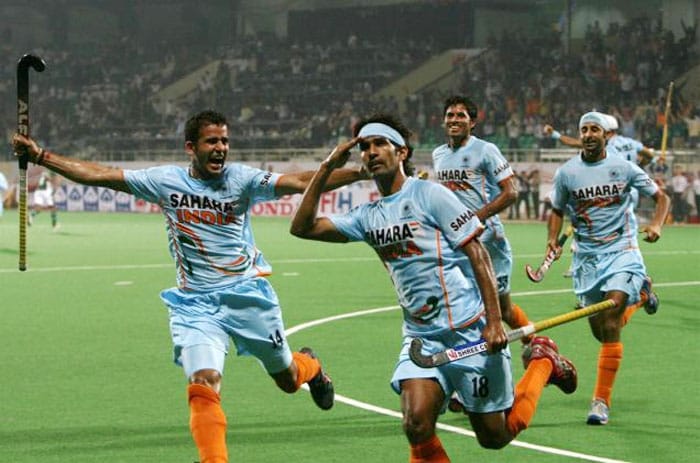 The twelfth edition of the men's hockey World Cup was held in India in New Delhi's Major Dhyan Chand National Stadium. Great amount of interest was generated in the capital for the event as India looked to win back support and admiration for it's national sport.
The twelfth edition of the men's hockey World Cup was held in India in New Delhi's Major Dhyan Chand National Stadium. Great amount of interest was generated in the capital for the event as India looked to win back support and admiration for it's national sport.
The tournament had twelve teams divided in two groups for the preliminary round.
Group A saw big boys Germany and Netherlands dominate proceedings as they beat rest of the competition to fight for the top spot in the group. Germany topped the Group with 11 points and moved into the semis. Netherlands though had to fend off a great challenge from South Korea who finished equal on points with the dutch but missed out on a spot in the semis due to an inferior goal difference.
Group B generated more interest as hosts India and Pakistan were pitted against each other. In a highly charged encounter, India beat Pakistan 4-1 which gave hope to the entire nation about a semi final chance. -
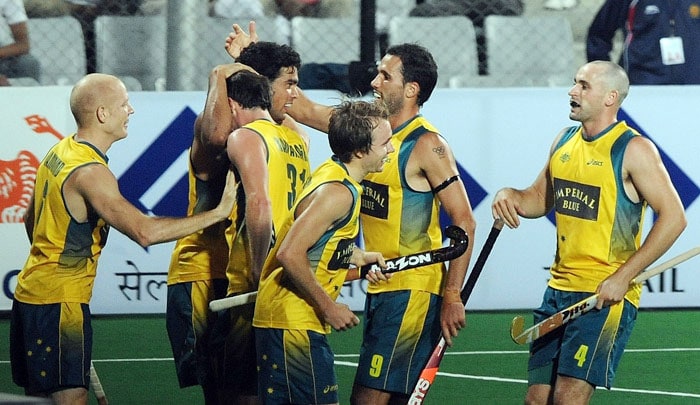 But those hopes were based more on passion than realism as the Indians crashed to big defeats against the big guns Australia, England and Spain to finish fourth in the group.
But those hopes were based more on passion than realism as the Indians crashed to big defeats against the big guns Australia, England and Spain to finish fourth in the group.
Australia and England finished at the top of the pool to qualify for the semis.
Pakistan were the biggest disappointment as they lost the last place match as well to finish with the wooden spoon. India too lost their play-off against Argentina to end the tournament placed eighth. -
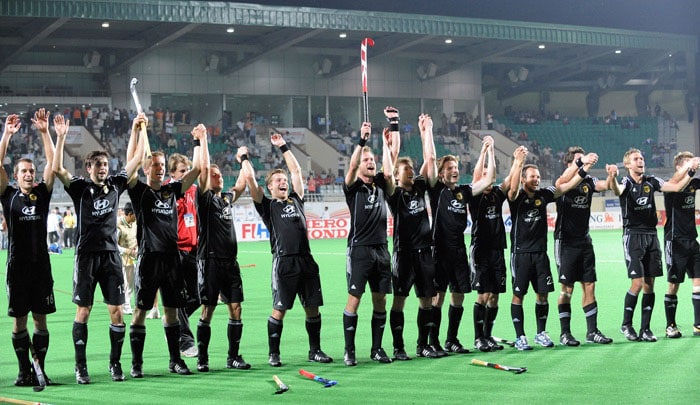 In the semis, the high flying Englishmen were cut to size by two time defending champions Germany who were runaway winners with a 4-1 margin.
In the semis, the high flying Englishmen were cut to size by two time defending champions Germany who were runaway winners with a 4-1 margin.
Australia fought hard to beat the Netherlands 2-1 in the other semi-final. As a result Germany and Australia squared off in the title round of the World Cup for the third time in a row with the Germans being the overwhelming favourites as they had beaten the 'Hockeyroos' in 2002 and 2006. -
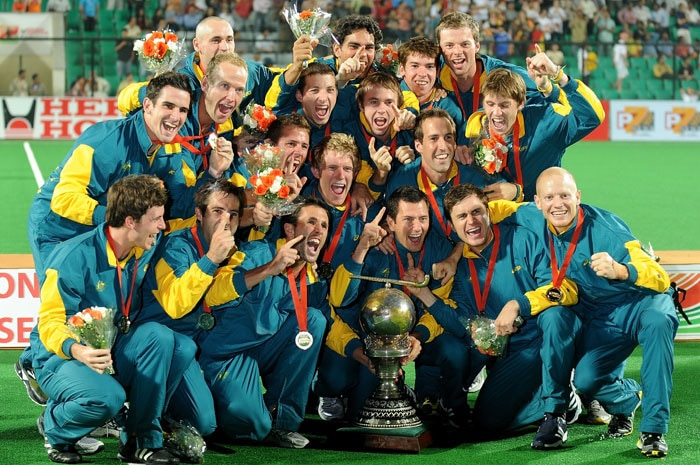 But it wasn't to be a hat-trick for the Germans as tournament top scorer Luke Doerner from Australia scored in the 60th minute to make sure that Australia finally won their second World Cup title after 1986. Interestingly, Ric Charlesworth the man who had led Australia to that title in '86 was the coach of the team this time.
But it wasn't to be a hat-trick for the Germans as tournament top scorer Luke Doerner from Australia scored in the 60th minute to make sure that Australia finally won their second World Cup title after 1986. Interestingly, Ric Charlesworth the man who had led Australia to that title in '86 was the coach of the team this time. -
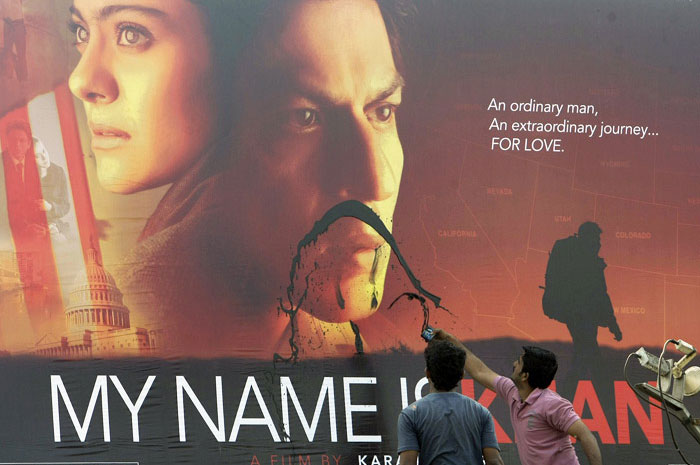 MNIK- Shiv Sena controversy: The release of SRK starrer My Name Is Khan was marred by the Badshah's ill timed criticism of the fact that no Pakistani cricketers had been bought by the IPL. Shiv Sena's misplaced patriotism raised it's ugly head against the Kolkata Knight Riders' owner, burning effigies of him and threatening to block the release of My Name Is Khan unless the star apologized. SRK stood his ground and offered to meet Shiv Sena supremo Bal Thackeray to discuss the issue. Theatres across Mumbai refused to open bookings for the movie and those that did were attacked by Sena activists. The Maharashtra government stepped in and My Name Is Khan opened to full houses against a backdrop of tight police supervision.
MNIK- Shiv Sena controversy: The release of SRK starrer My Name Is Khan was marred by the Badshah's ill timed criticism of the fact that no Pakistani cricketers had been bought by the IPL. Shiv Sena's misplaced patriotism raised it's ugly head against the Kolkata Knight Riders' owner, burning effigies of him and threatening to block the release of My Name Is Khan unless the star apologized. SRK stood his ground and offered to meet Shiv Sena supremo Bal Thackeray to discuss the issue. Theatres across Mumbai refused to open bookings for the movie and those that did were attacked by Sena activists. The Maharashtra government stepped in and My Name Is Khan opened to full houses against a backdrop of tight police supervision. -
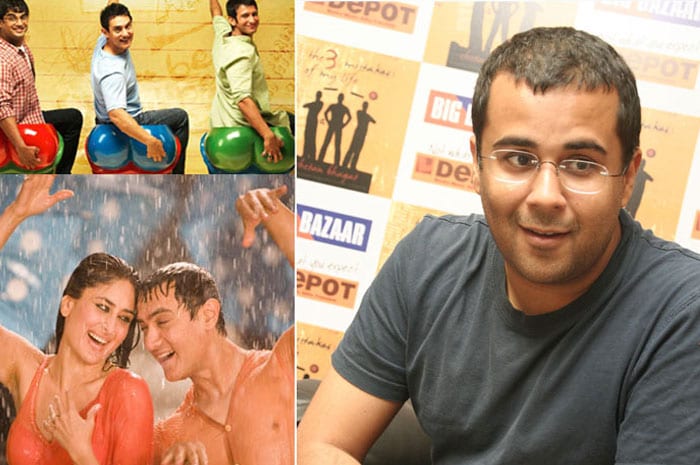 Aamir Khan starrer 3 Idiots made headlines even before it released in 2009 and the controversy spilled over into this year. Author Chetan Bhagat's book Five Point Someone was credited as being the basis for the story, but this was not enough for Bhagat who maintained that producer Vidhu Vinod Chopra had copied the entire story from his book. Vidhu Vinod Chopra and Aamir were joined by director Rajkumar Hirani in a press conference they held to make their stand clear.
Aamir Khan starrer 3 Idiots made headlines even before it released in 2009 and the controversy spilled over into this year. Author Chetan Bhagat's book Five Point Someone was credited as being the basis for the story, but this was not enough for Bhagat who maintained that producer Vidhu Vinod Chopra had copied the entire story from his book. Vidhu Vinod Chopra and Aamir were joined by director Rajkumar Hirani in a press conference they held to make their stand clear. -
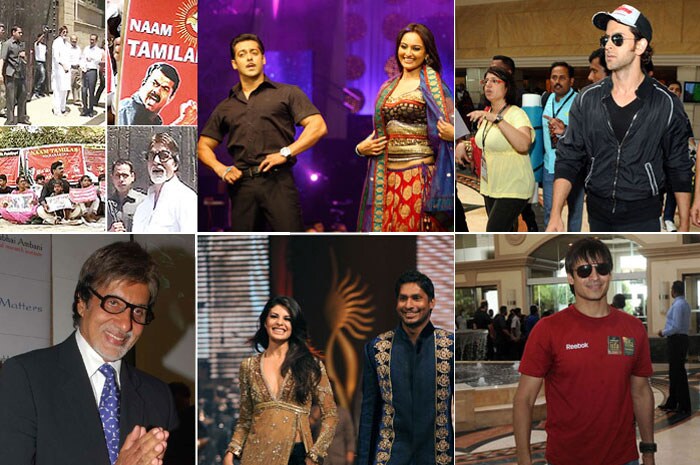 IIFA 2010 was held in Sri Lanka with the intention of showcasing the country's emergence from 30 years of civil war. The move backfired as the Tamil film fraternity was up in arms that the awards were to be held at a venue associated with the deaths of Tamil civilians. Rajnikanth, Kamal Haasan, Vijay, Ajith, Suriya, Mani Ratnam and the rest of the Southern galaxy refused to have anything to do with the event. Angry Tamil protesters parked themselves outside IIFA ambassador Amitabh Bachchan's residence. Finally, Big B and many others from Bollywood stayed away from IIFA 2010. Among the few who did go were Salman Khan, Hrithik Roshan, Bipasha Basu, Lara Dutta and Riteish Deshmukh
IIFA 2010 was held in Sri Lanka with the intention of showcasing the country's emergence from 30 years of civil war. The move backfired as the Tamil film fraternity was up in arms that the awards were to be held at a venue associated with the deaths of Tamil civilians. Rajnikanth, Kamal Haasan, Vijay, Ajith, Suriya, Mani Ratnam and the rest of the Southern galaxy refused to have anything to do with the event. Angry Tamil protesters parked themselves outside IIFA ambassador Amitabh Bachchan's residence. Finally, Big B and many others from Bollywood stayed away from IIFA 2010. Among the few who did go were Salman Khan, Hrithik Roshan, Bipasha Basu, Lara Dutta and Riteish Deshmukh -
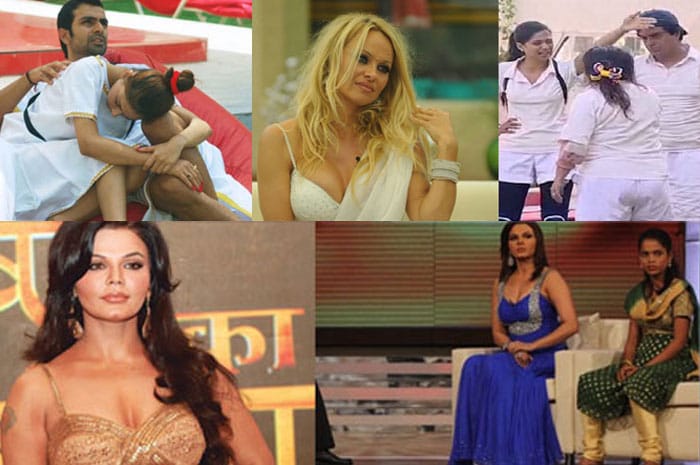 Reality bit back hard when Bigg Boss 4 and Rakhi Ka Insaaf discovered there was only so much sleaze and sensation they could get away with on national television. A televised wedding night and an alleged suicide finally prompted the Information and Broadcasting Ministry to all but pull the plug on the increasingly obscene shows. Both shows were moved out of TV prime time to after 11pm and the government decision got support from unexpected quarters including former Bigg Boss participants who agreed that the content was unfit for general consumption.
Reality bit back hard when Bigg Boss 4 and Rakhi Ka Insaaf discovered there was only so much sleaze and sensation they could get away with on national television. A televised wedding night and an alleged suicide finally prompted the Information and Broadcasting Ministry to all but pull the plug on the increasingly obscene shows. Both shows were moved out of TV prime time to after 11pm and the government decision got support from unexpected quarters including former Bigg Boss participants who agreed that the content was unfit for general consumption. -
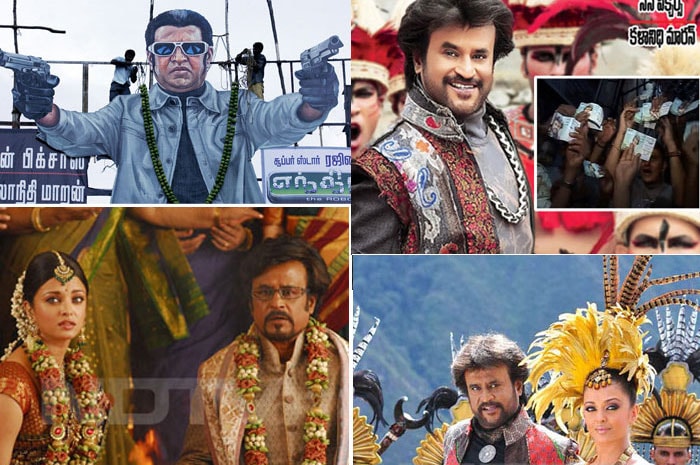 Endhiran a.k.a Robot was an out and out Rajinikanth film, complete with larger than life action sequences and hero worship. Not only is it the costliest Indian movie of all time at Rs 162 crore, it also got the biggest opening for an Indian film. Aishwarya Rai Bachchan added the required sugar to the movie, while Rajini-mania assured that the movie recover its production cost quite easily.
Endhiran a.k.a Robot was an out and out Rajinikanth film, complete with larger than life action sequences and hero worship. Not only is it the costliest Indian movie of all time at Rs 162 crore, it also got the biggest opening for an Indian film. Aishwarya Rai Bachchan added the required sugar to the movie, while Rajini-mania assured that the movie recover its production cost quite easily. -
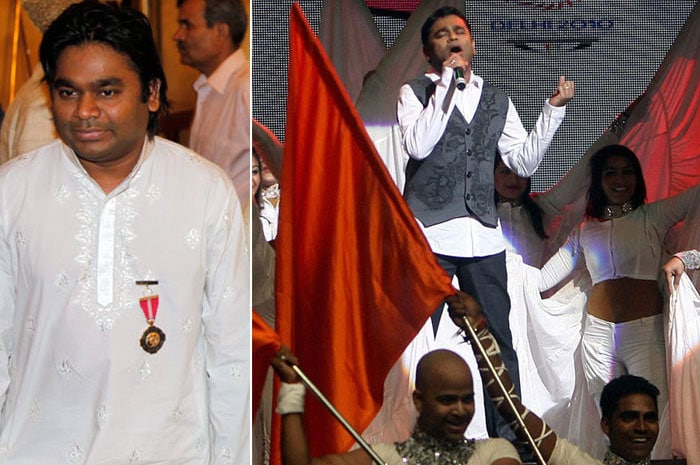 Music maestro A R Rahman's composition for the Common Wealth Games 2010 was a disappointment, and he so admits it. Apologising for letting us down with his ‘not upto the mark' anthem, he stated ‘testing only on the younger generation' as the reason. Later, India Bula Liya was ‘tweaked' a bit, but the damage was already done.
Music maestro A R Rahman's composition for the Common Wealth Games 2010 was a disappointment, and he so admits it. Apologising for letting us down with his ‘not upto the mark' anthem, he stated ‘testing only on the younger generation' as the reason. Later, India Bula Liya was ‘tweaked' a bit, but the damage was already done. -
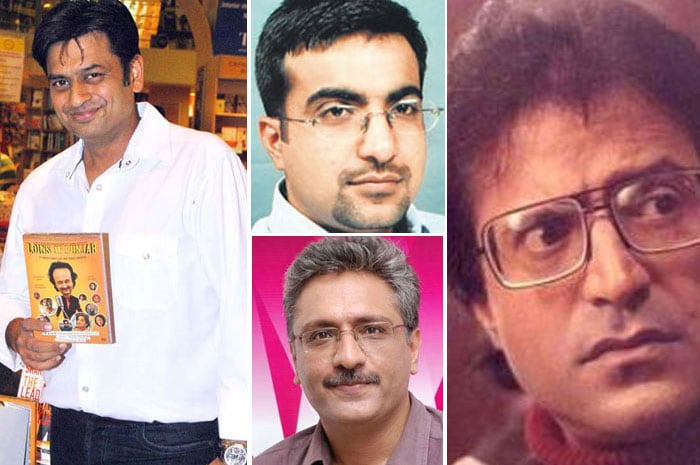 This year the film industry has suffered the loss of a lot of young, irreplaceable talent. While directors Manish Acharya and Pankaj Advani both passed away, filmmaker Sourabh Usha Narang succumbed to stomach cancer. Jaane Bhi Do Yaaron actor Ravi Baswani also died of heart attack. Strange!
This year the film industry has suffered the loss of a lot of young, irreplaceable talent. While directors Manish Acharya and Pankaj Advani both passed away, filmmaker Sourabh Usha Narang succumbed to stomach cancer. Jaane Bhi Do Yaaron actor Ravi Baswani also died of heart attack. Strange! -
 Dominance of Apple
Dominance of Apple
The year began with Apple revolutionizing the computing market with the launch of the iPad, which sold 5,00,000 units of the Wi-Fi only in the first week. And the year ended with rumours of iPad 2 and what all it'll have. In the middle Apple gave the iPods a complete makeover. But, the biggest hype around any Apple product was of course the iPhone 4. It did set new records of 1.7 million units sold in the first 3 days of launch, but it was also in the eye of the storm. Apart from spotting yellow dots on the display to the whole “Antenna Issue”, where Steve Jobs showed us how to hold the iPhone 4, it still managed to be one of the most desired products created by Apple. Apple did close the year with a bang by launching the new generation of MacBook Airs, particularly the 11 inch version! -
 The Social Network!
The Social Network!
From facing security issues, to revamping the mobile Facebook experience. From real life rumours of @facebook.com email account to reel life adaptation in one hell of a movie. It's been a rollercoaster ride for Facebook.com. We really can't wait to get our hands on an email account that says @facebook.com. Watch out Google! Despite facing a large number of security issues in 2010, Facebook still took a strong stand against the infamous WikiLeaks supporters. -
 Eclair, Frozen Yogurt and Gingerbread! My favorite deserts!
Eclair, Frozen Yogurt and Gingerbread! My favorite deserts!
3,00,000 Android phones activated in one day! iPhone beware! Google's open source OS has already taken the lead in the war of the mobile operating systems. Not only has the Android mobile OS made its mark amongst its competitors, it has also shown potential to become the ideal choice as an OS for tablets (although a few tweaks are still required for it to become the true tablet OS). With the likes of Samsung and Dell using Android to take on the iPad; this is one war that will intensify in 2011. -
 Move…with Kinect!
Move…with Kinect!
Nintendo may have revolutionized gaming with the Wii, but that is history. This year, Sony and Microsoft took motion gaming to a whole new level with the PlayStation Move and Microsoft Kinect. With 2010 marking the beginning of casual gamers taking motion gaming seriously, 2011 will be the year when the true potential of this technology is put to test! -
 The Cyber War of 2010
The Cyber War of 2010
If 1999 was the Year of Napster, then 2010 is definitely the year of WikiLeaks. Exposing a large array of secret government documents and gaining the support of numerous “Anonymous” hackers, WikiLeaks is definitely the birth point of judgement day!
Advertisement
Advertisement
Advertisement
Advertisement
